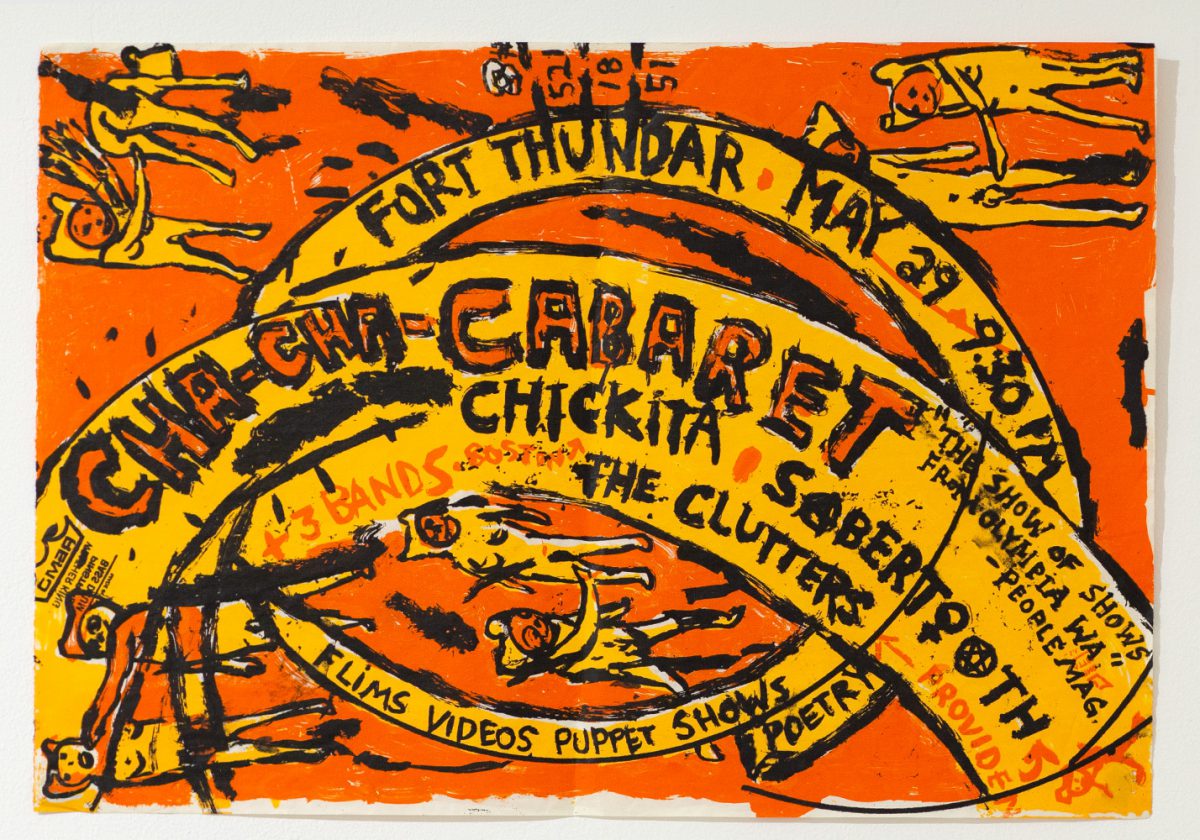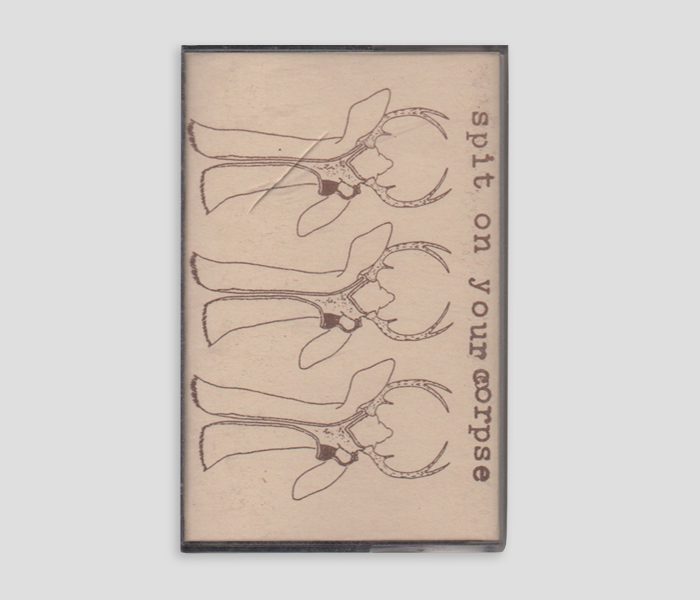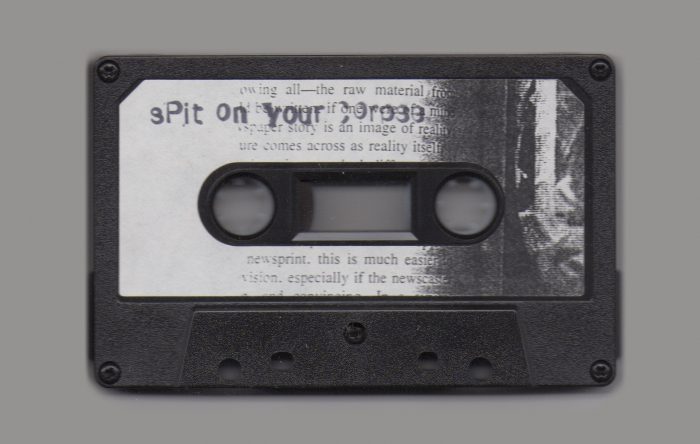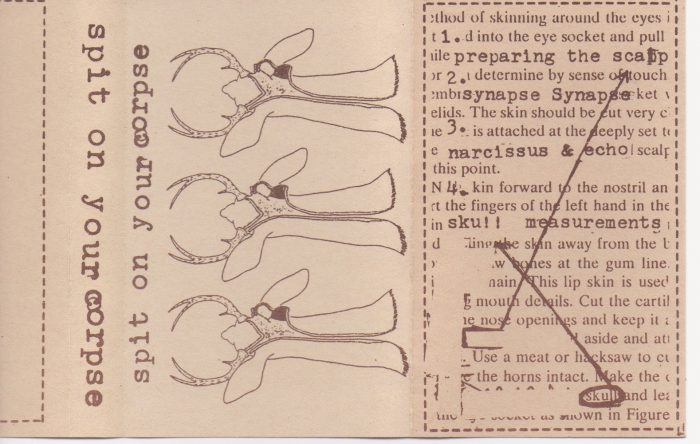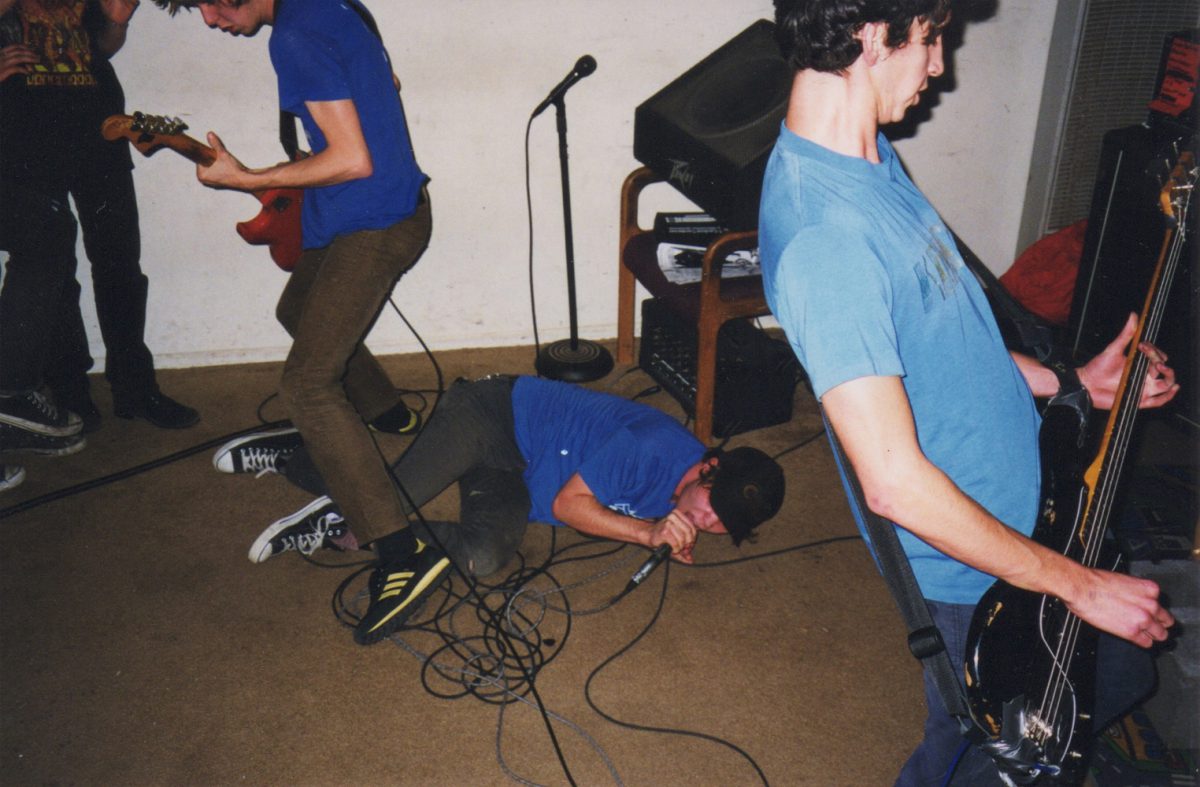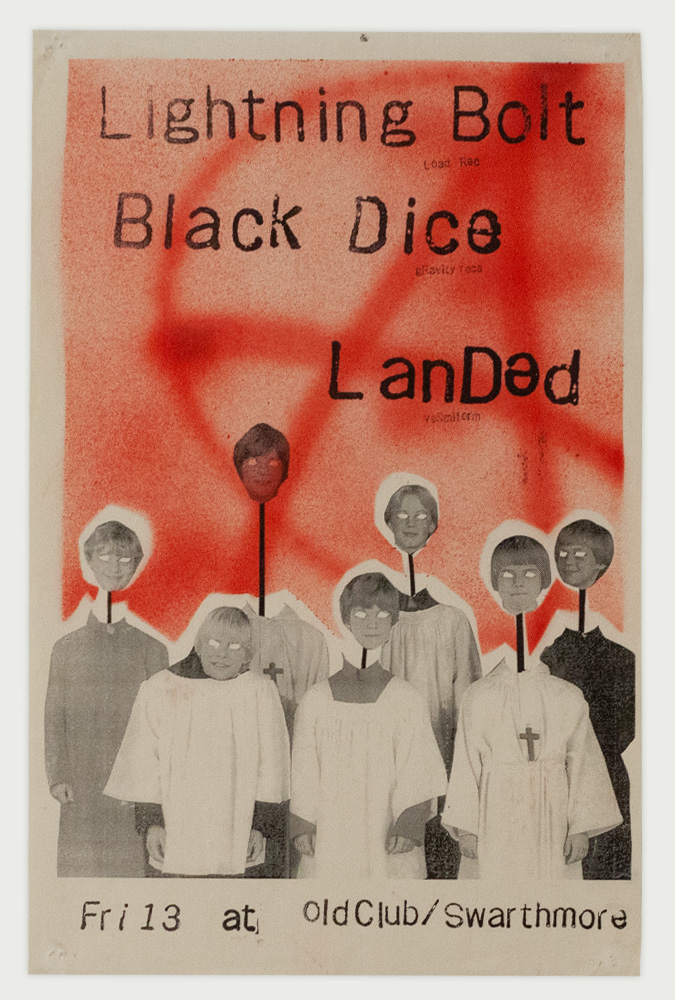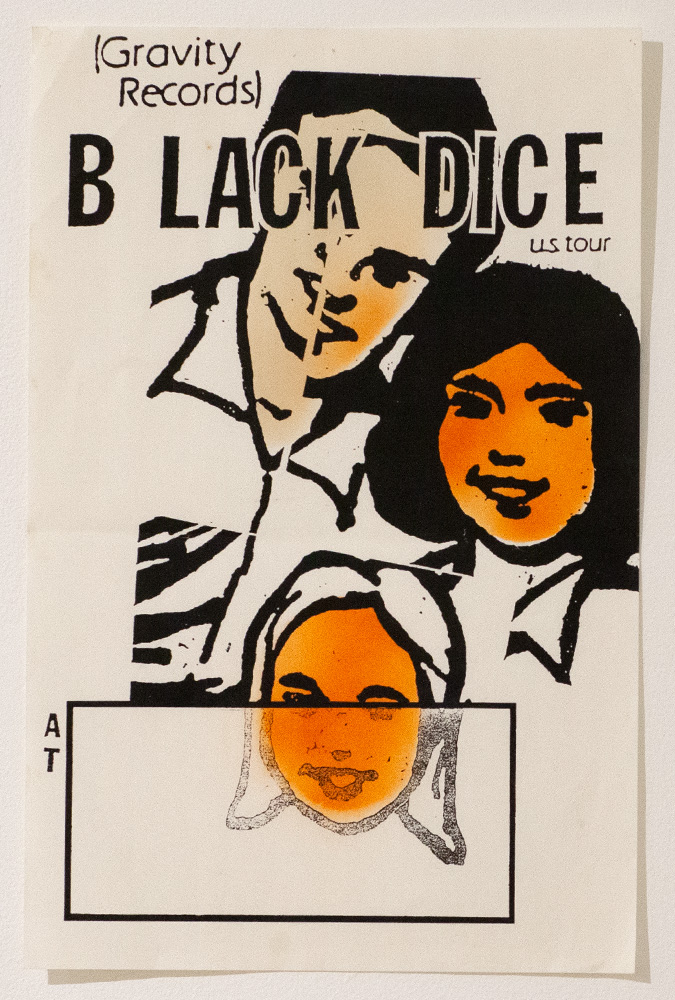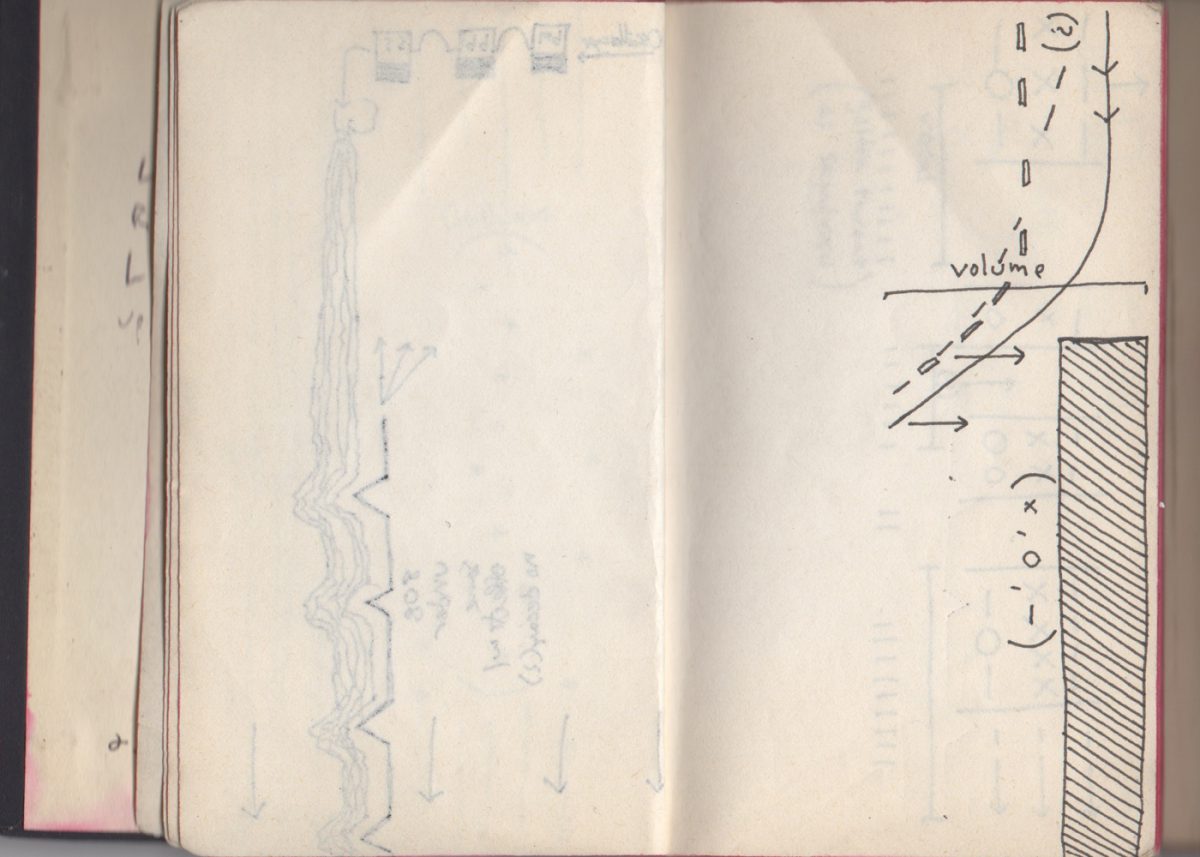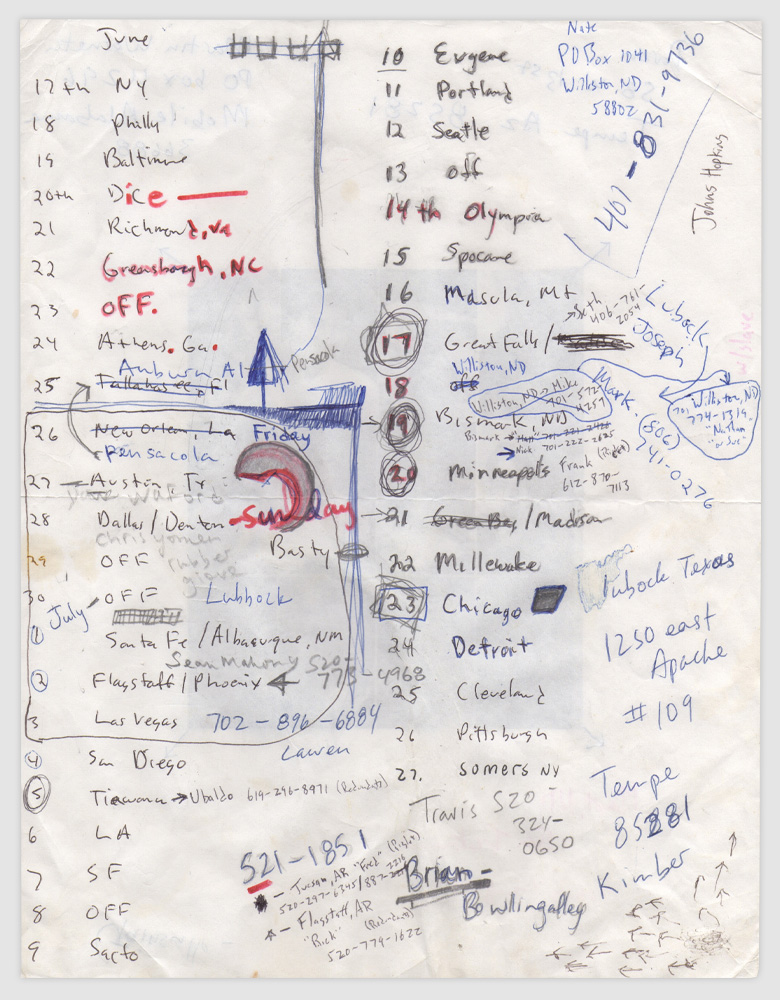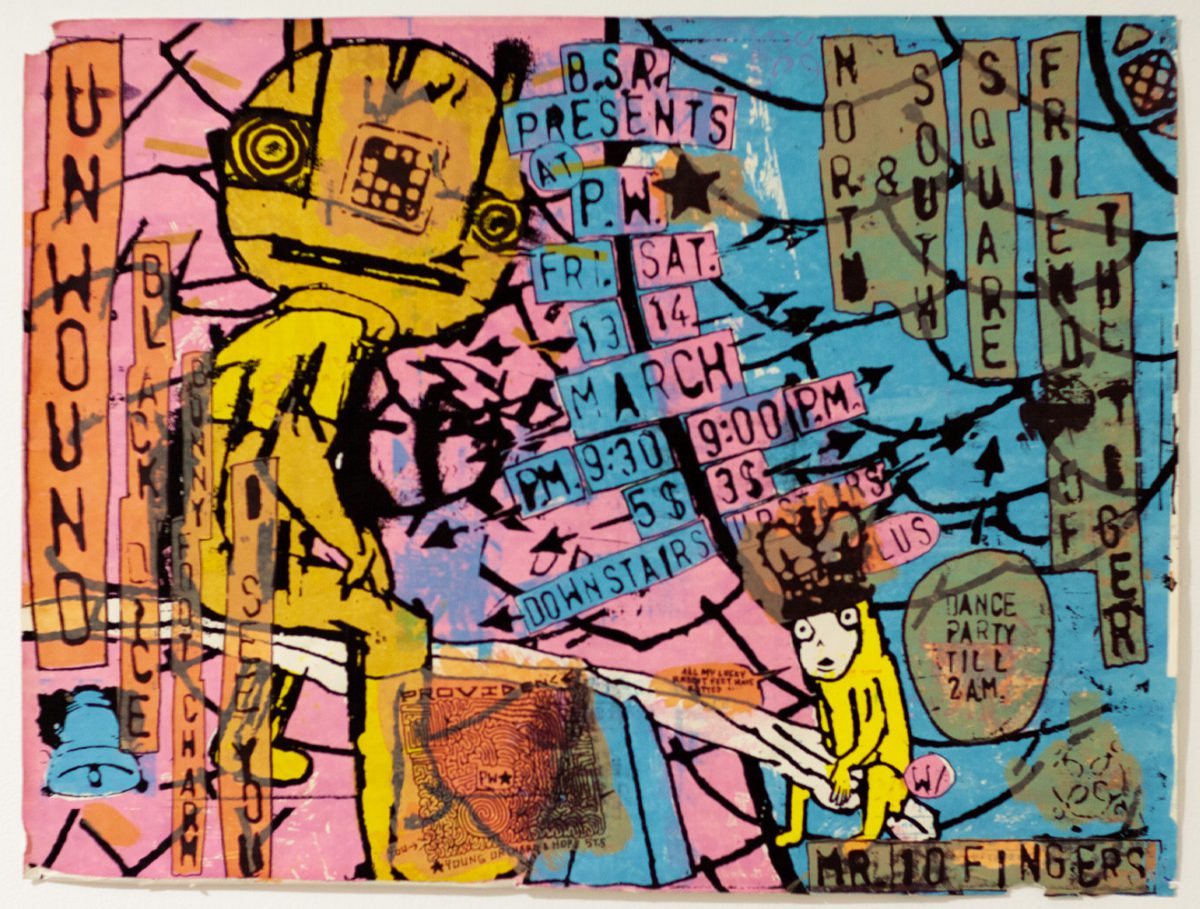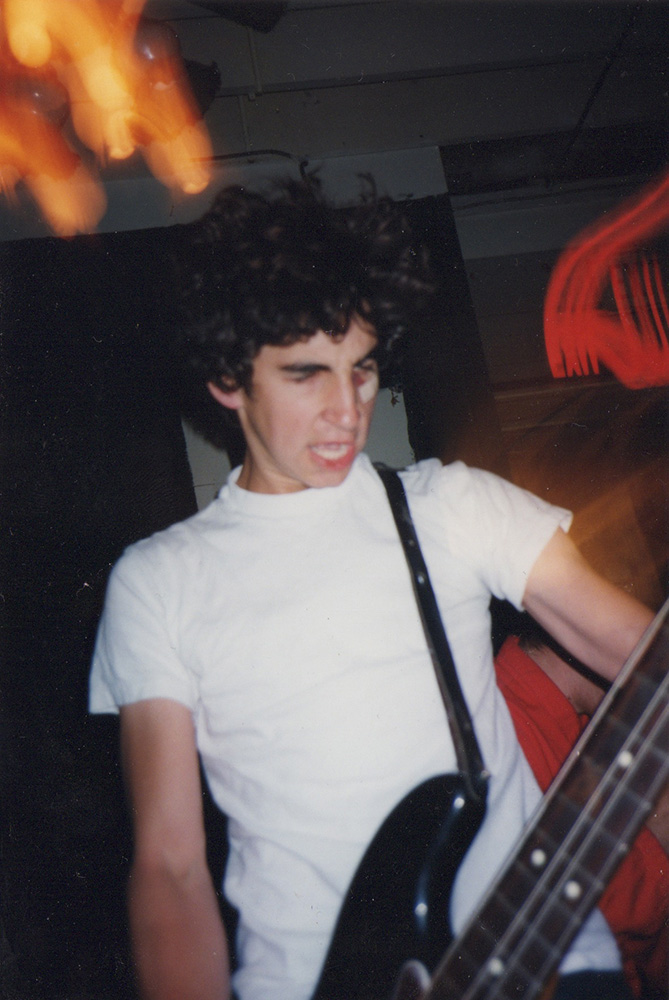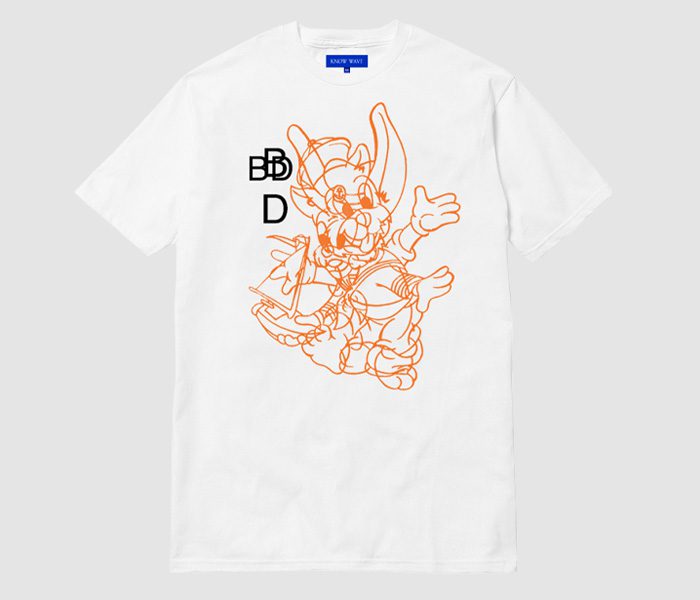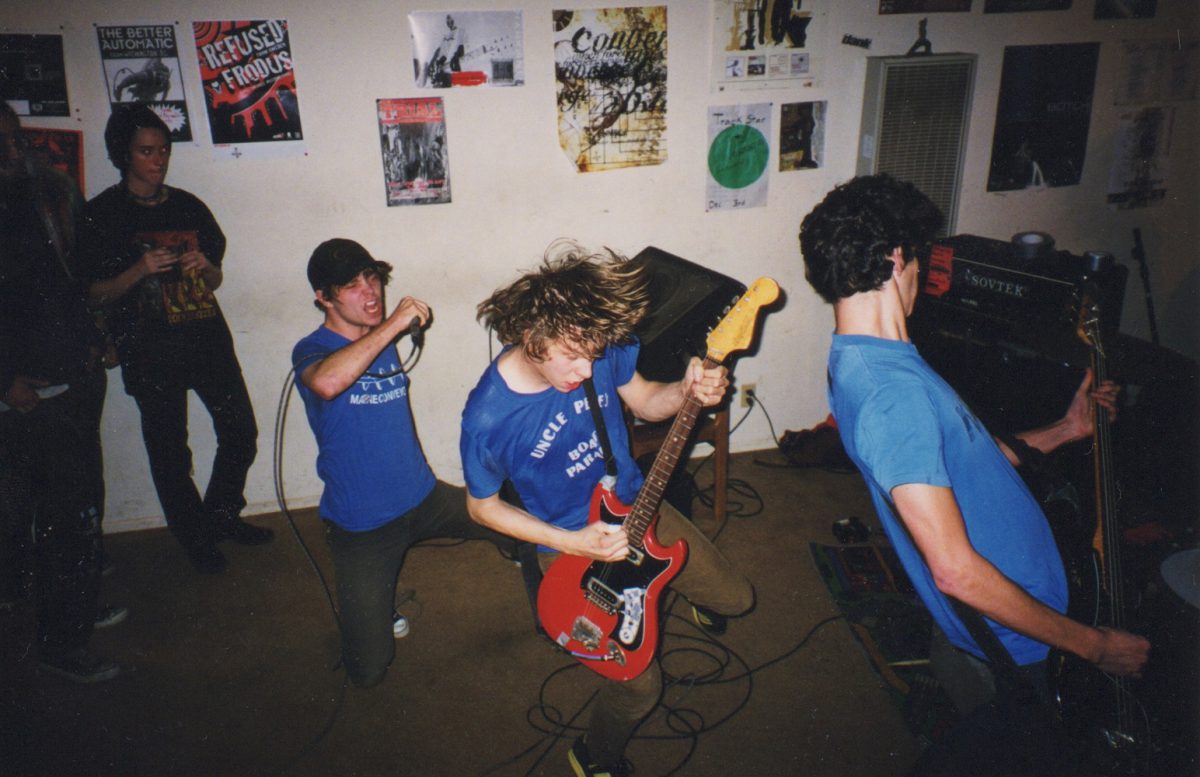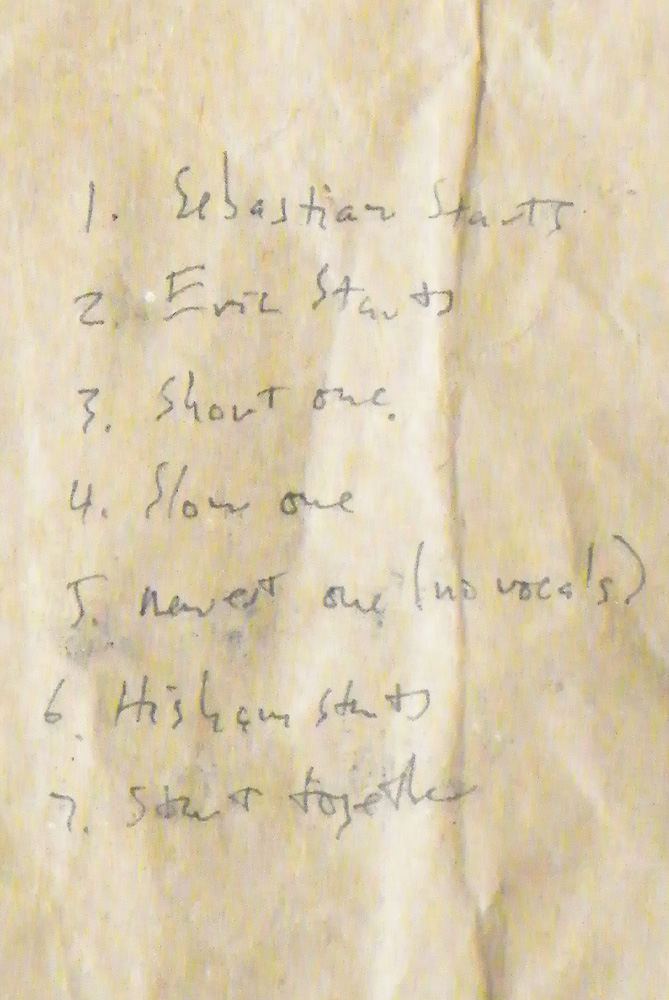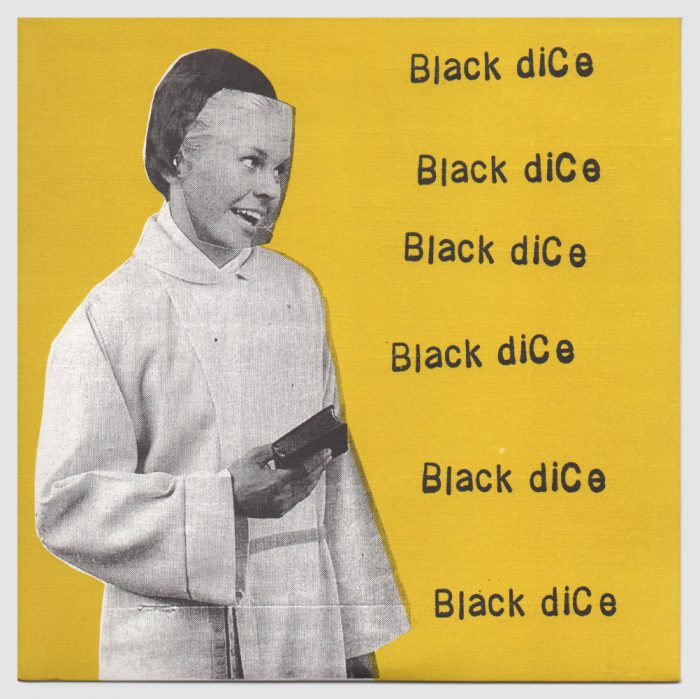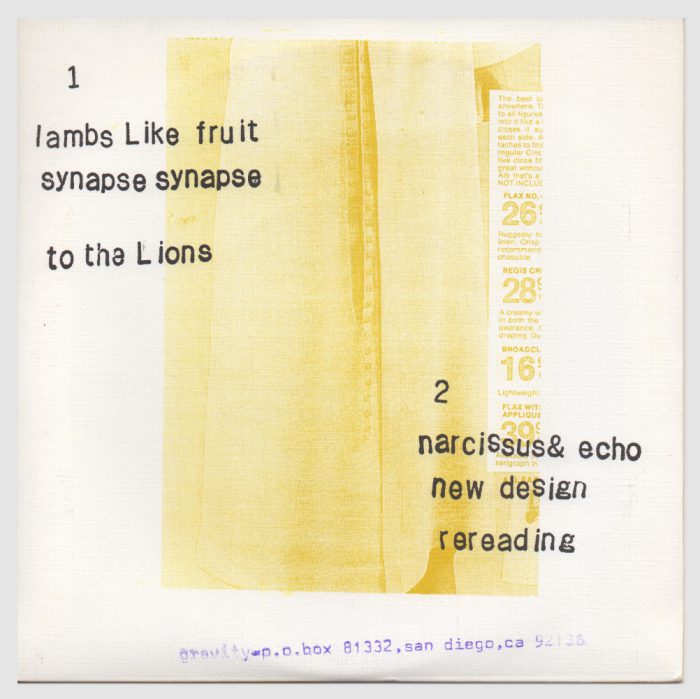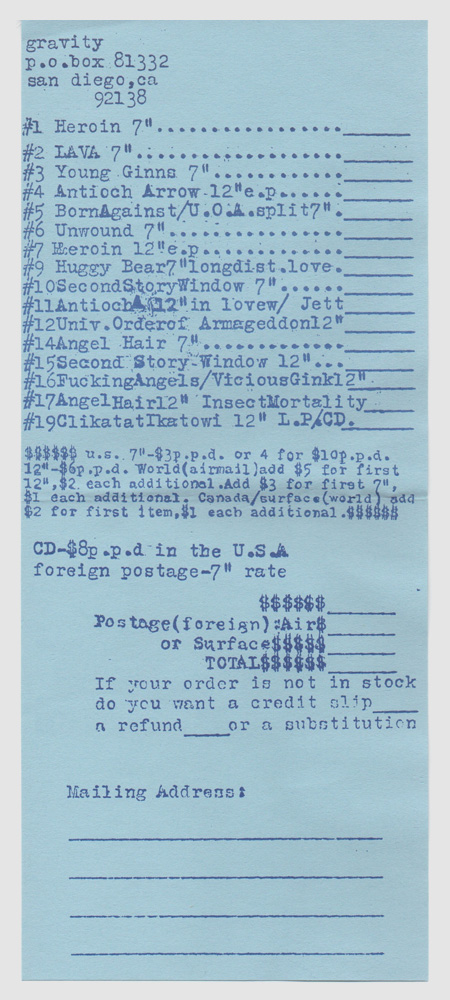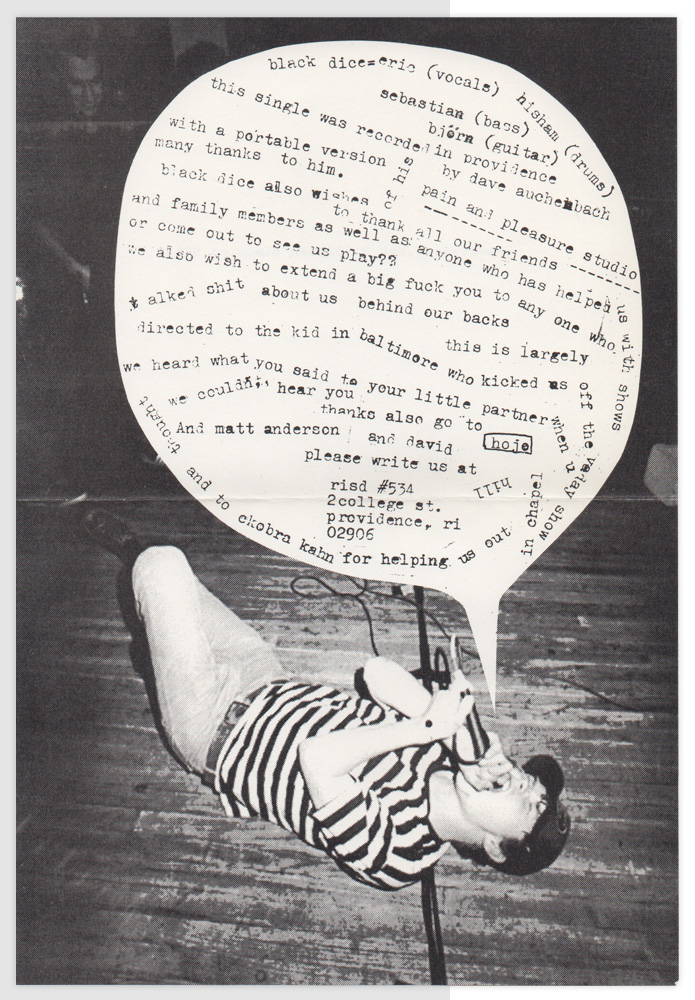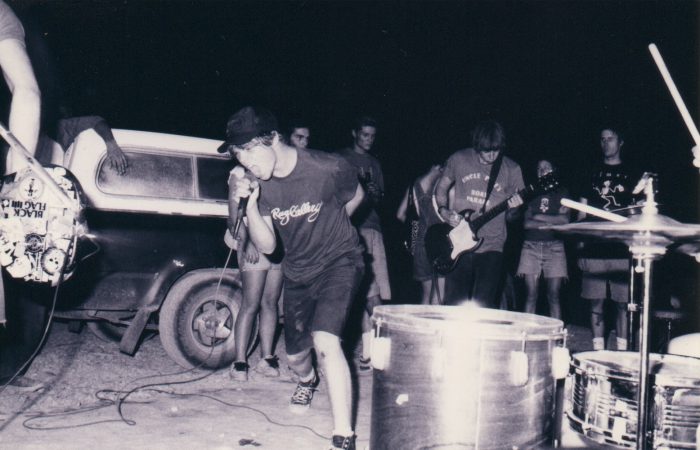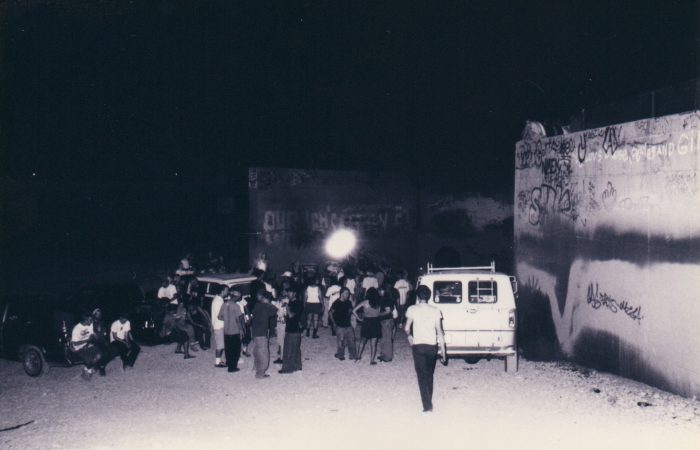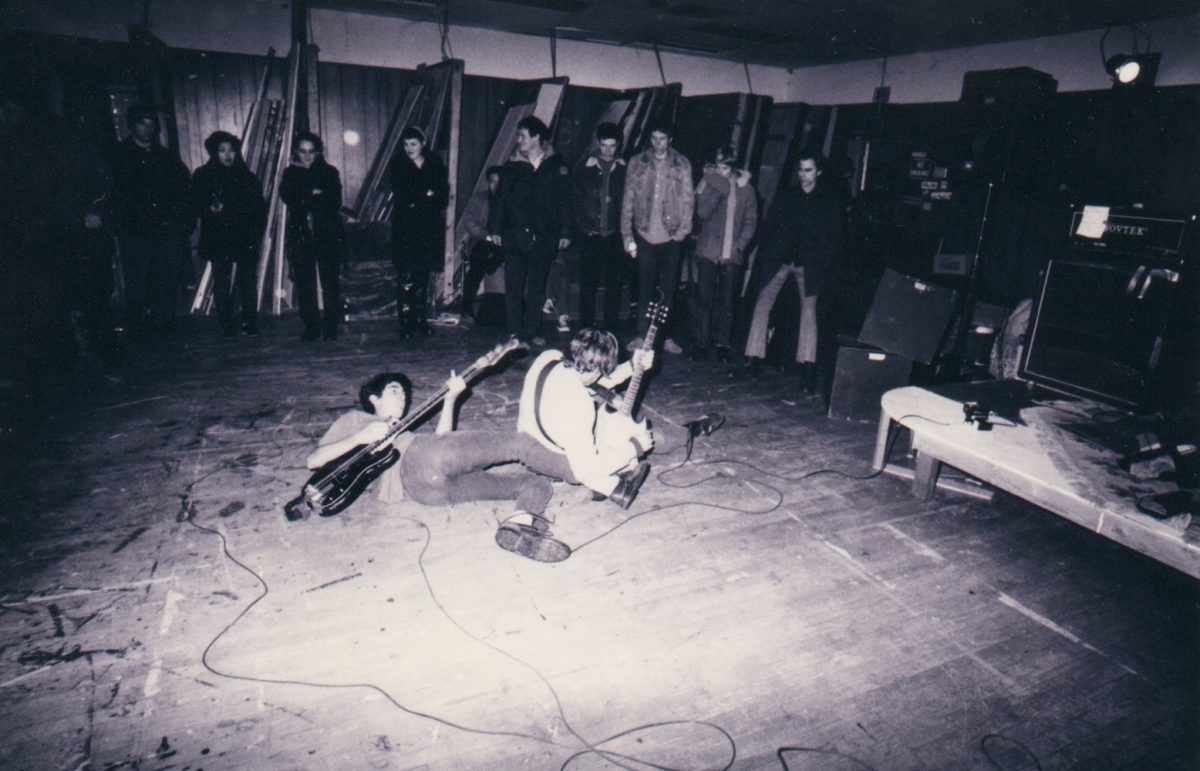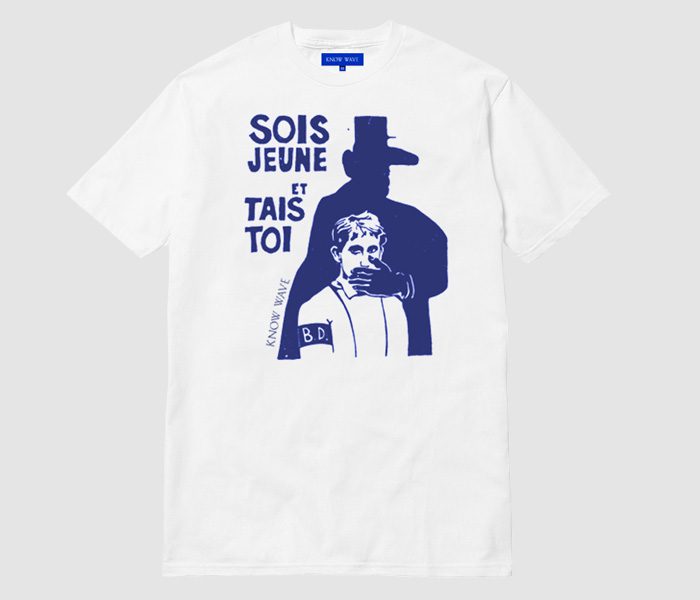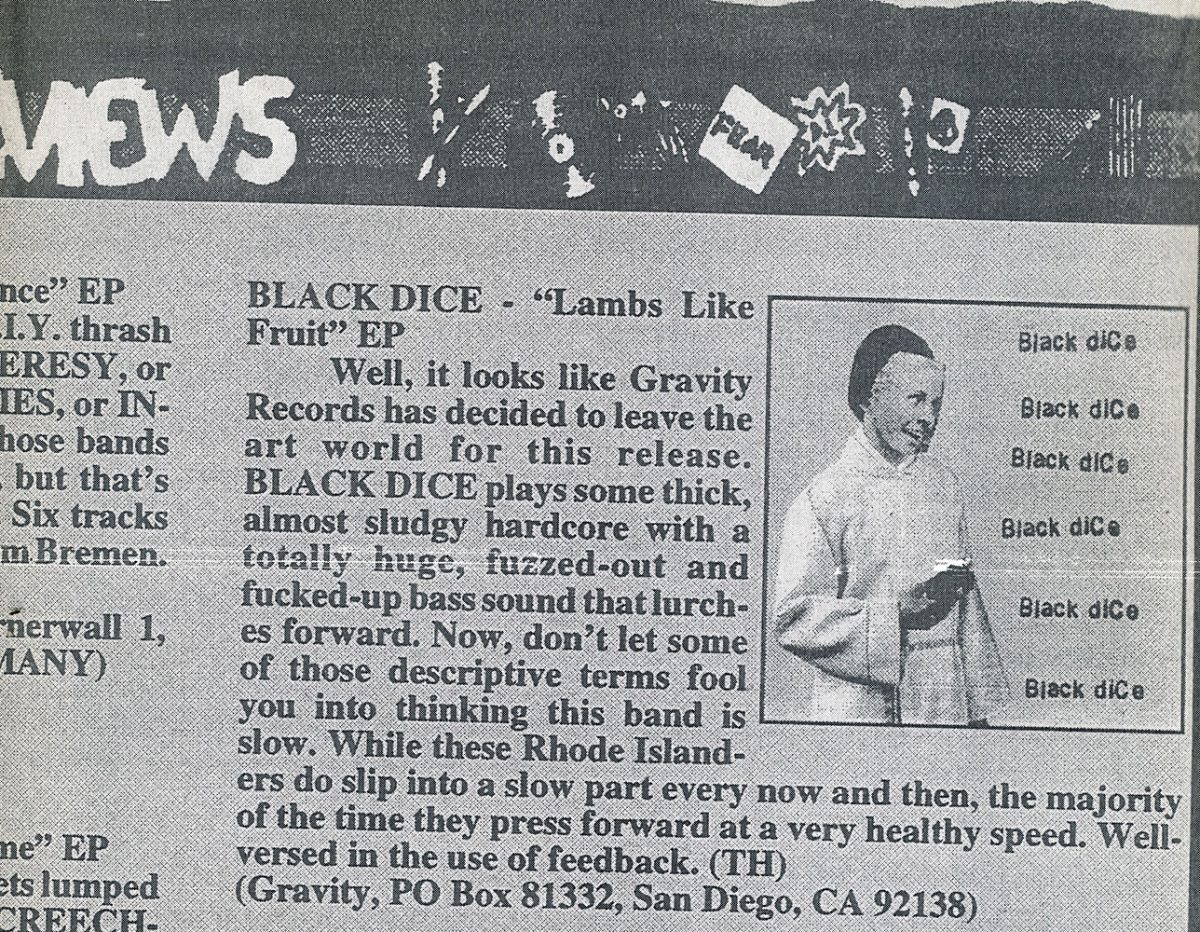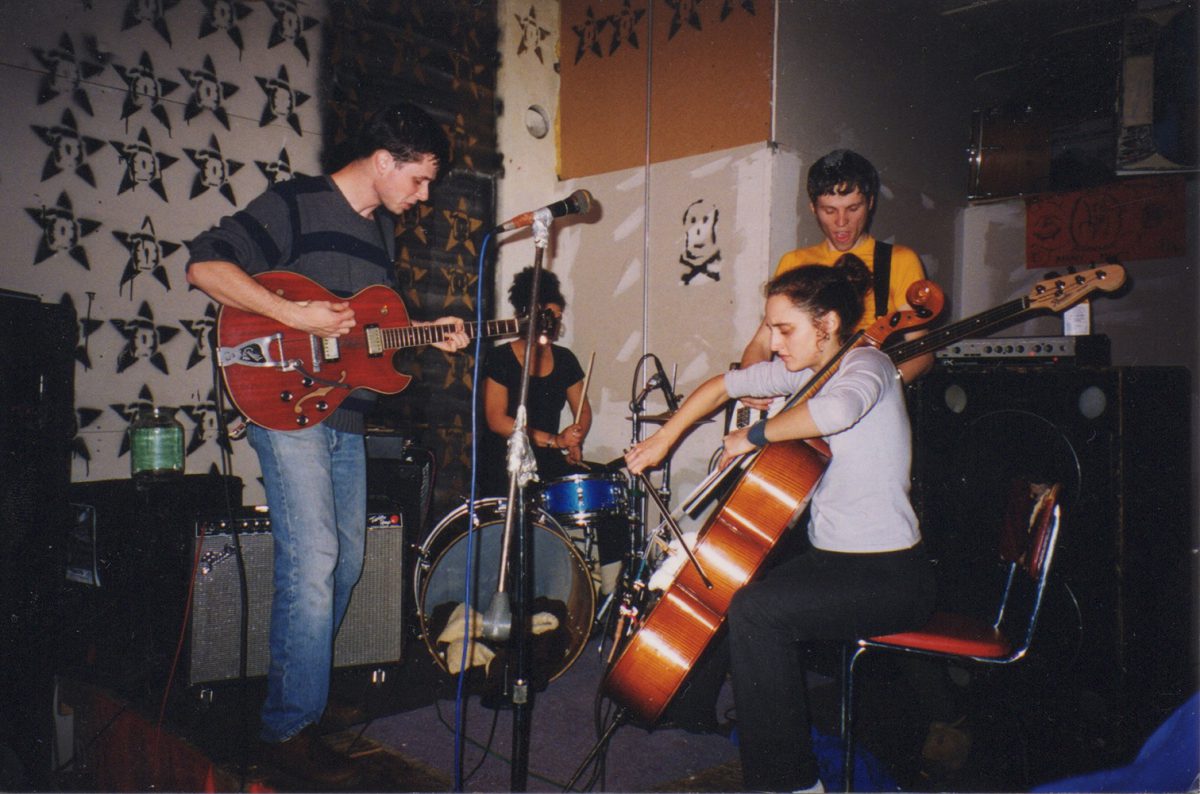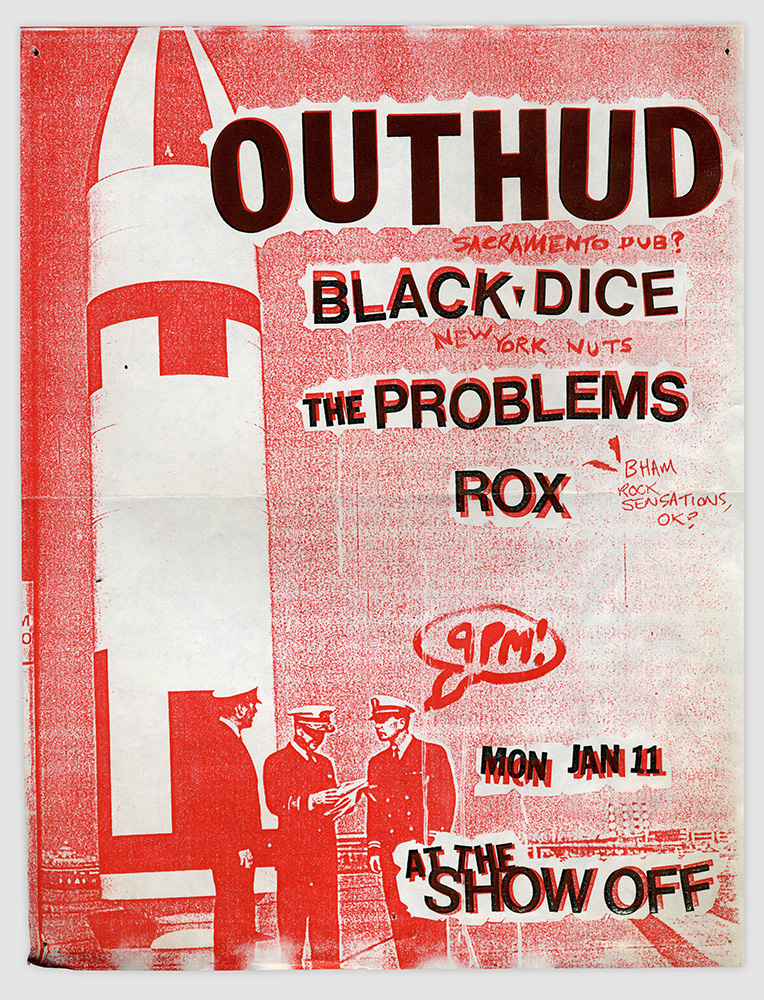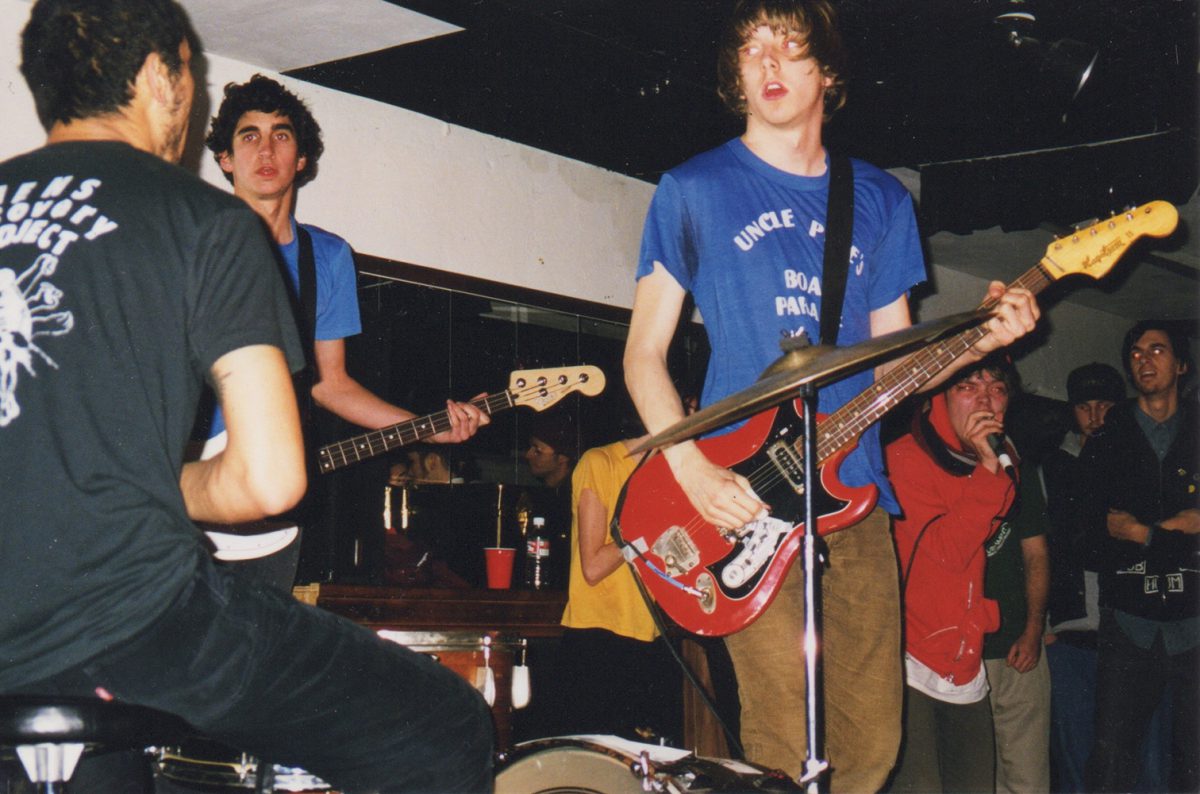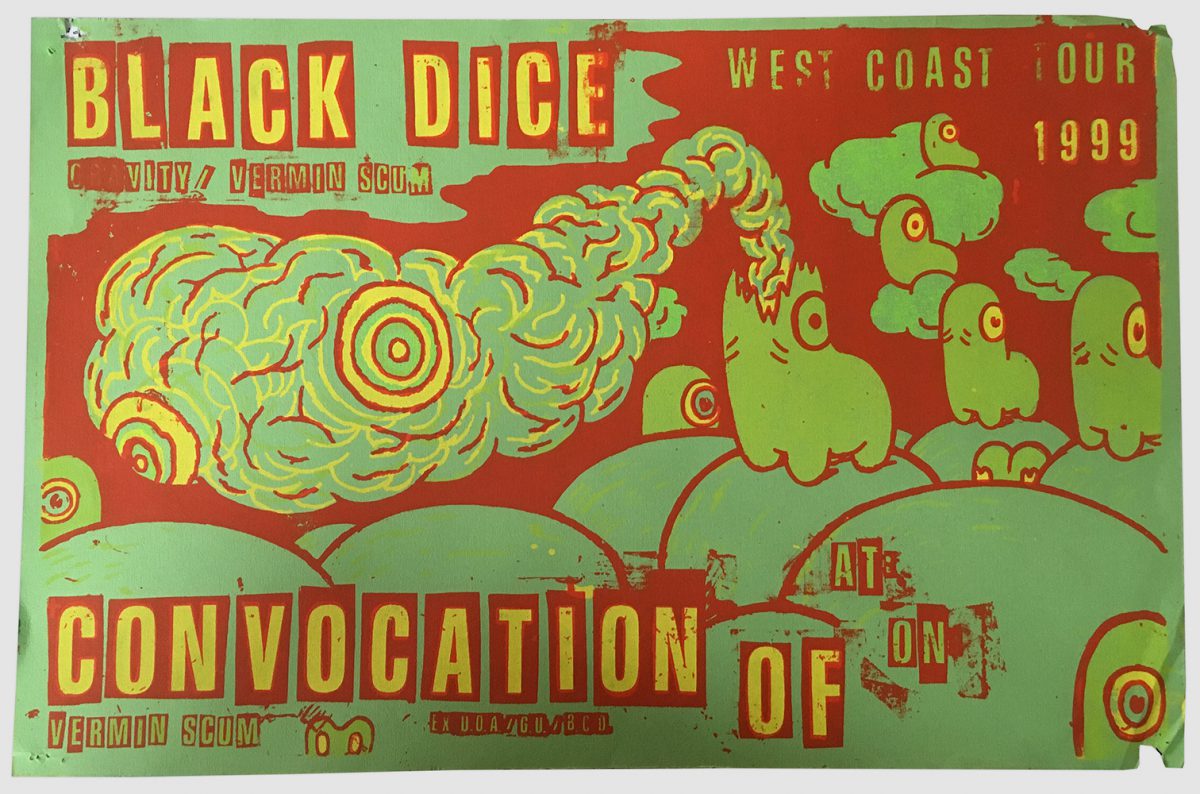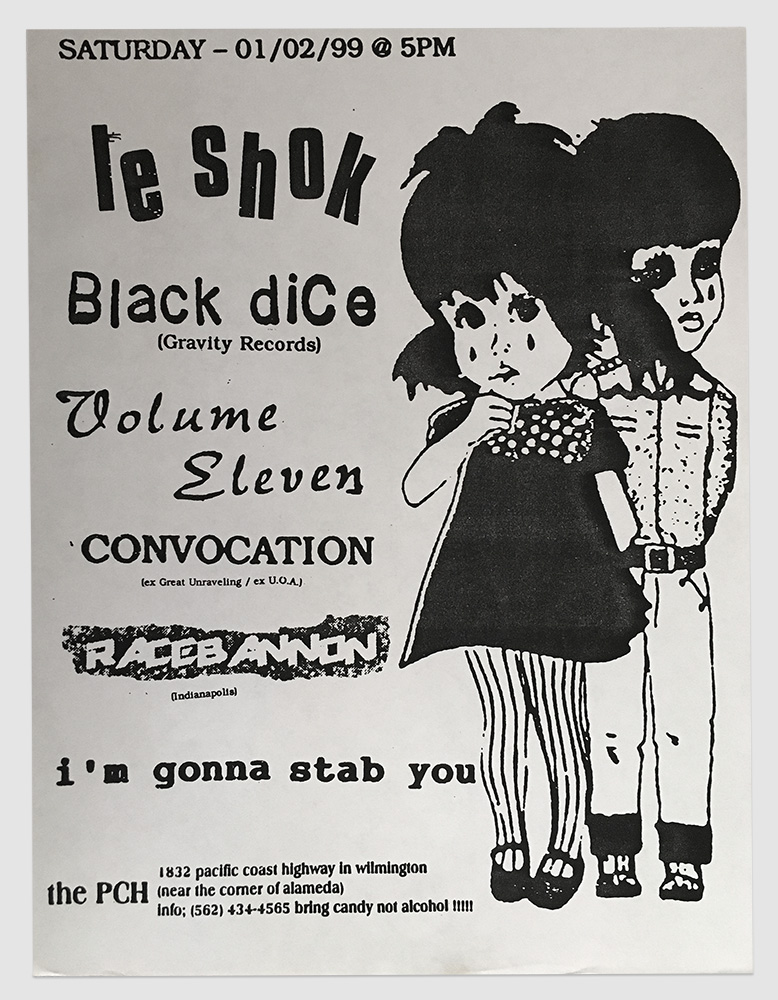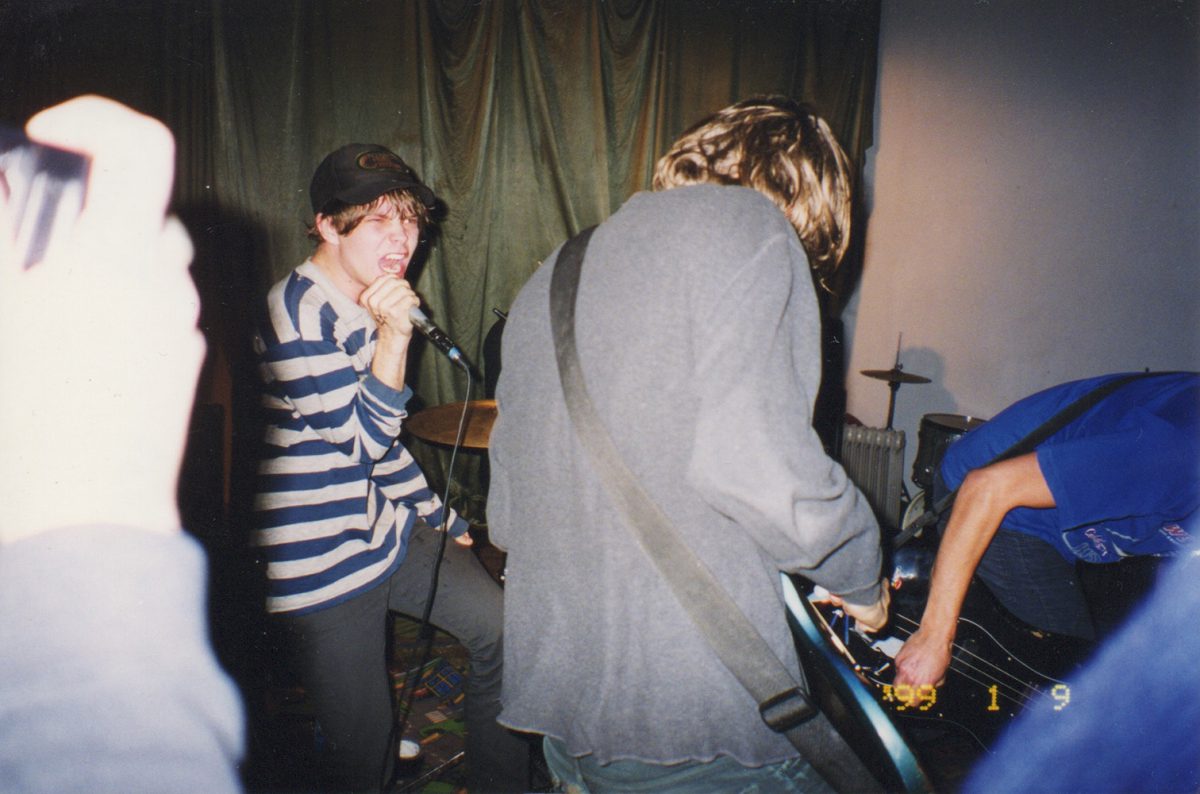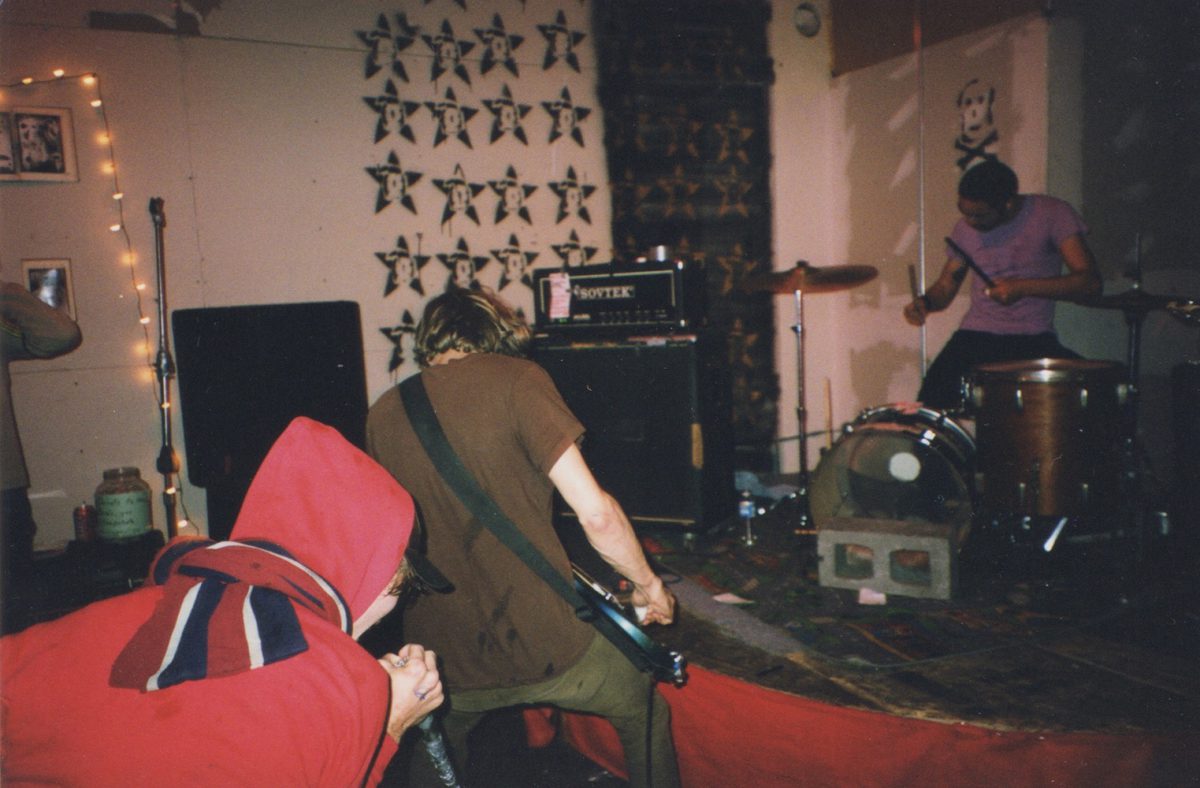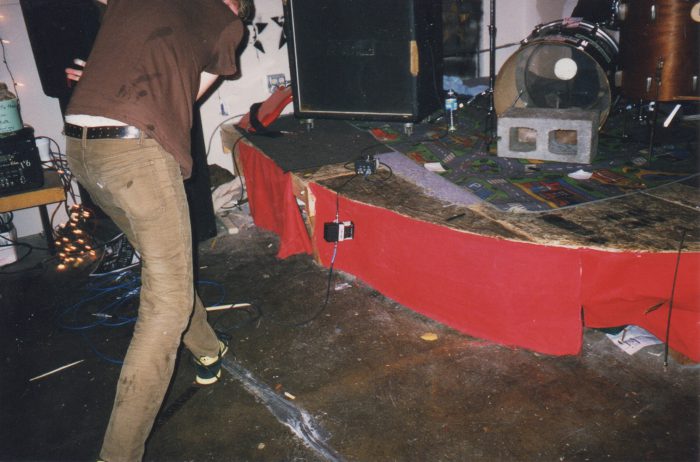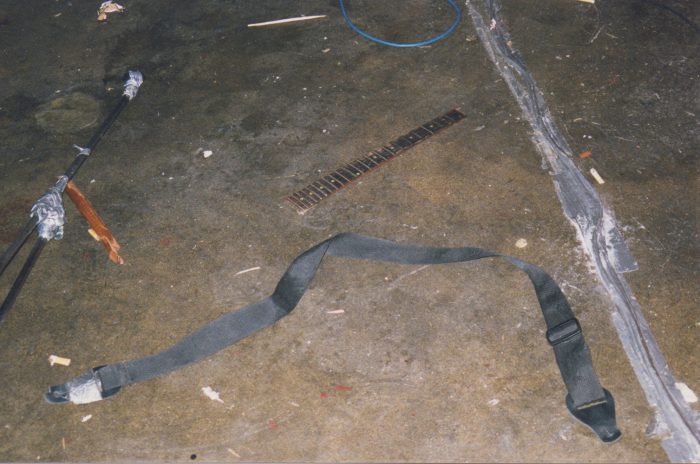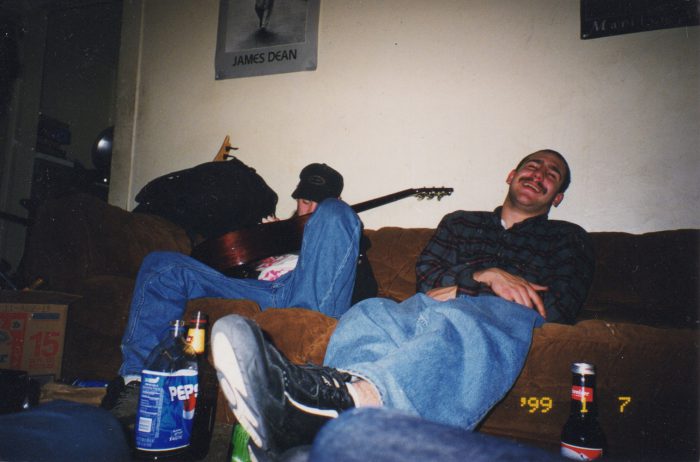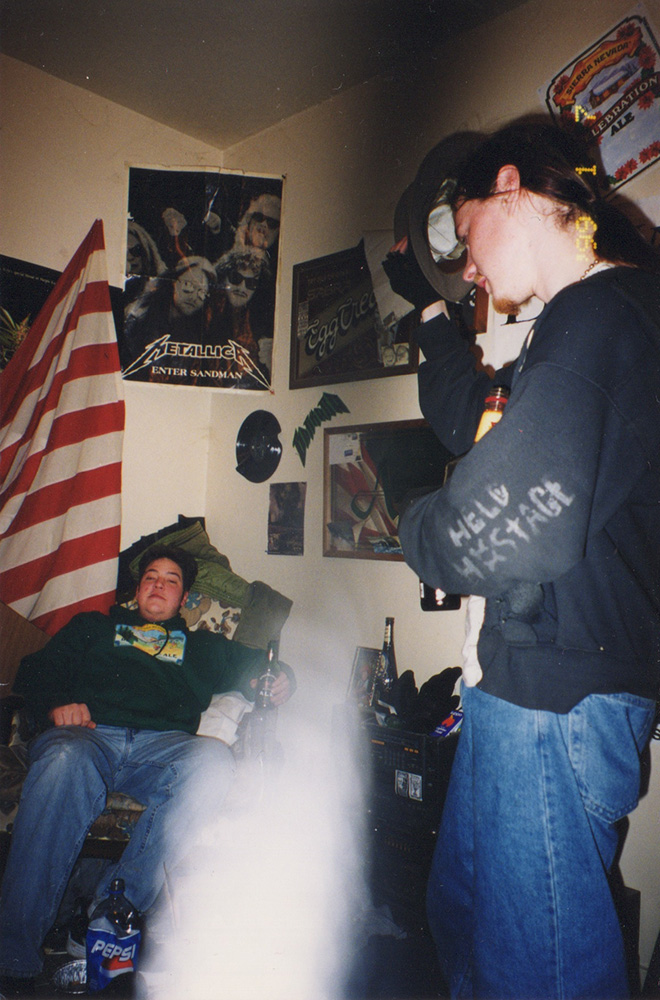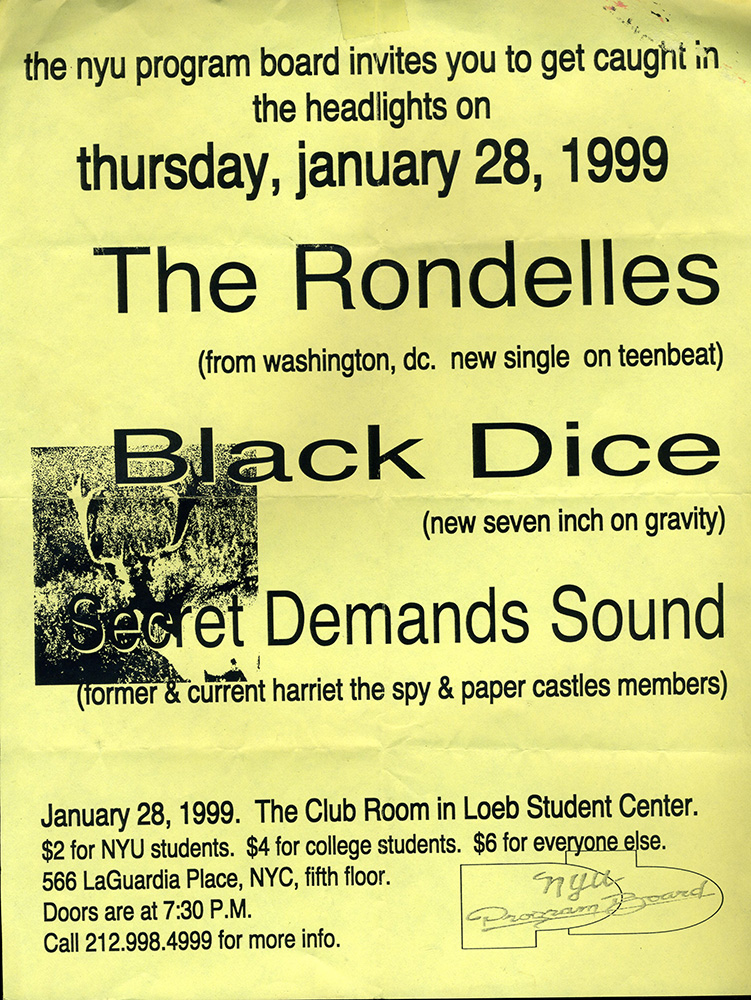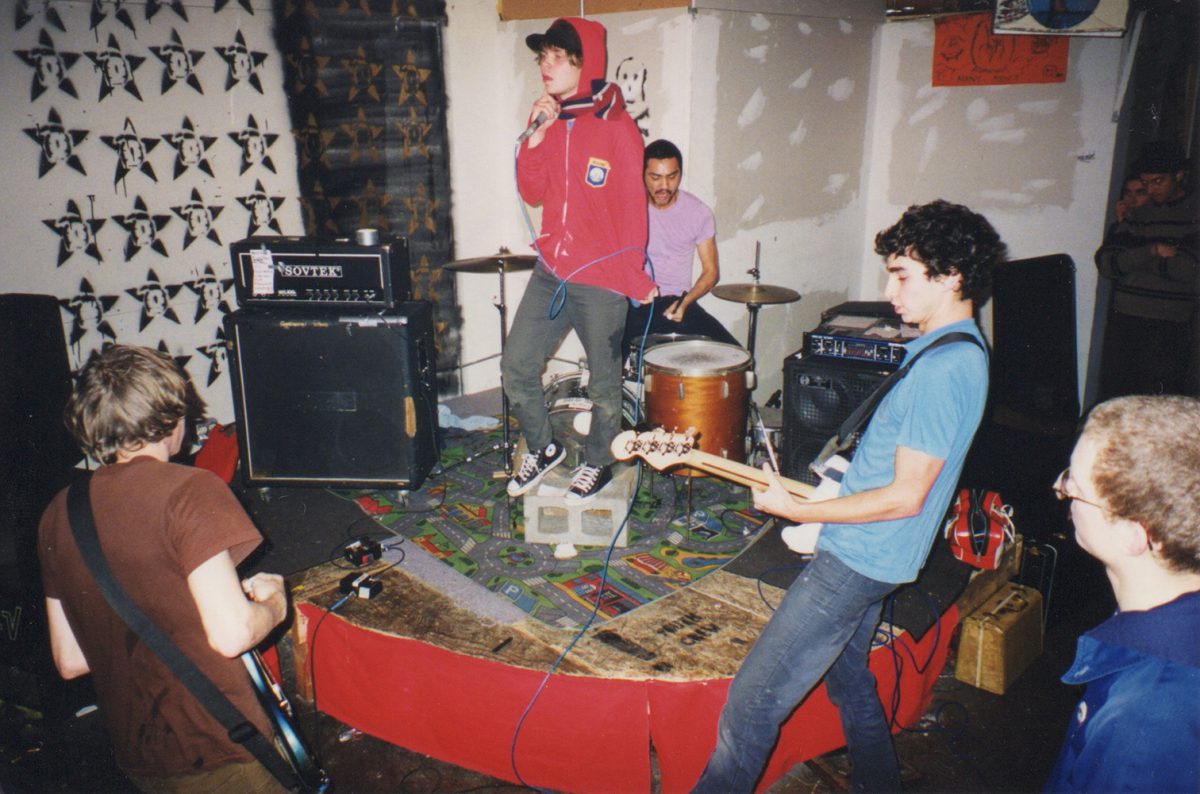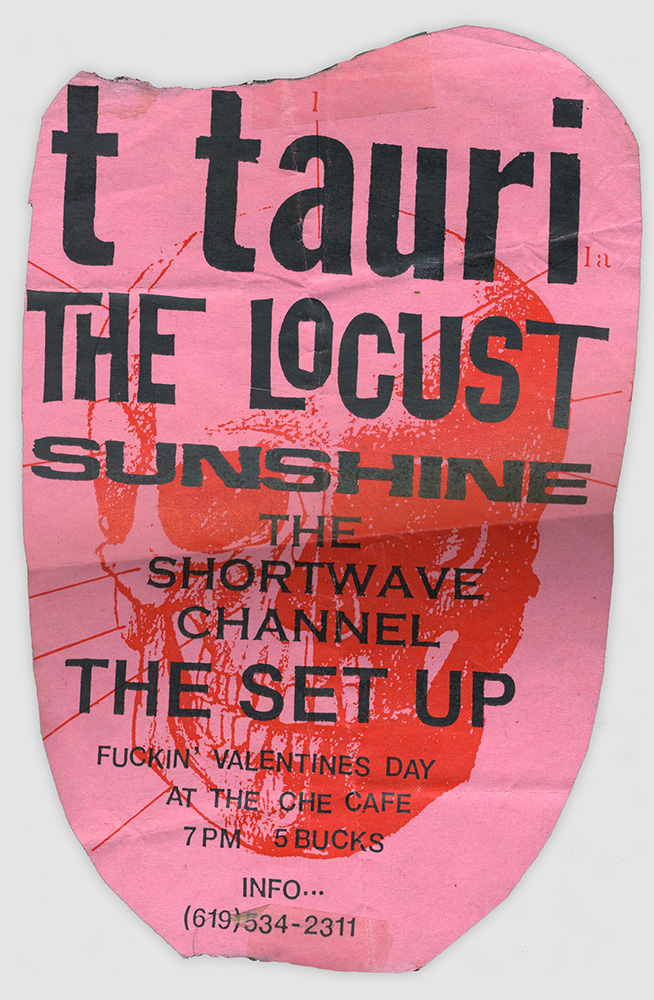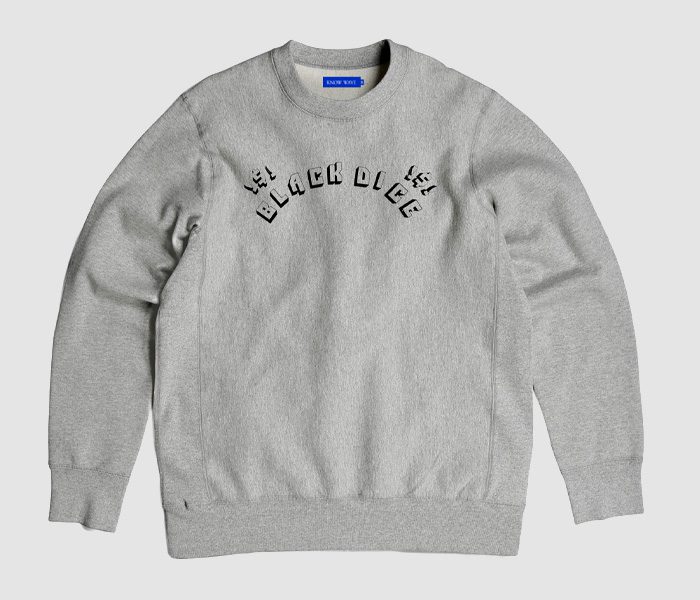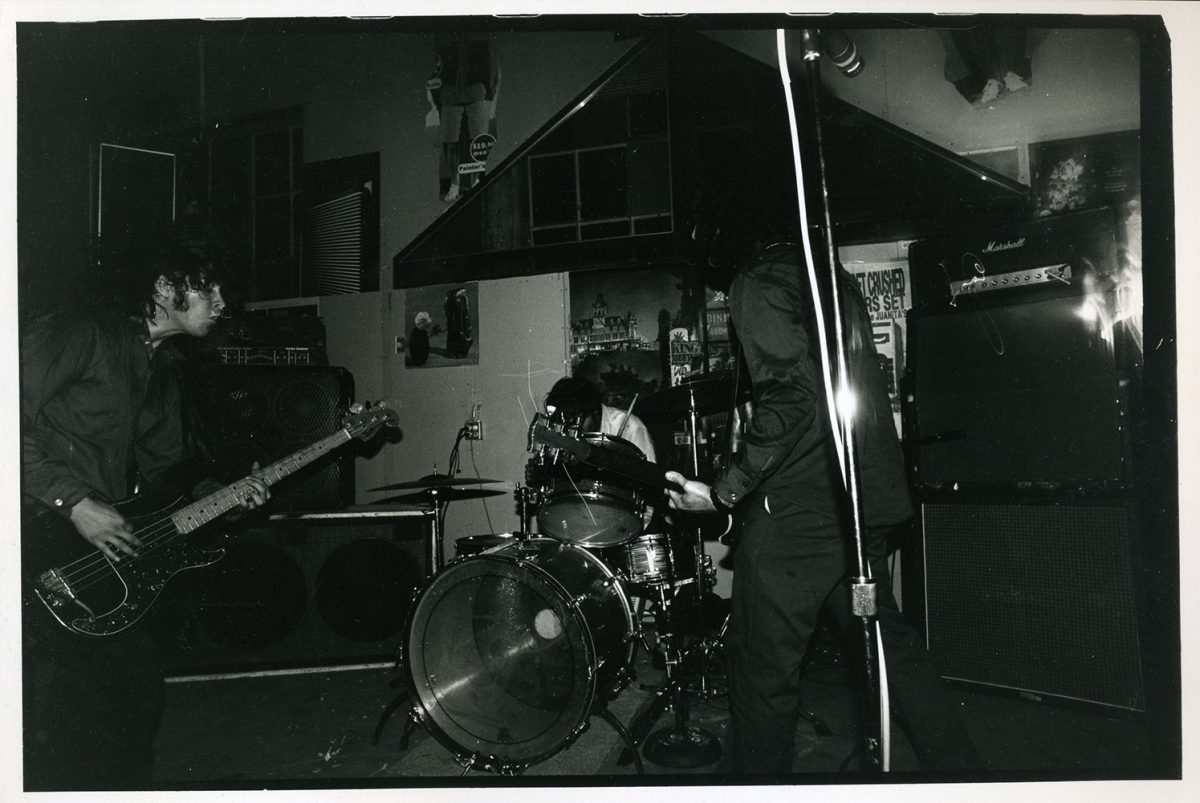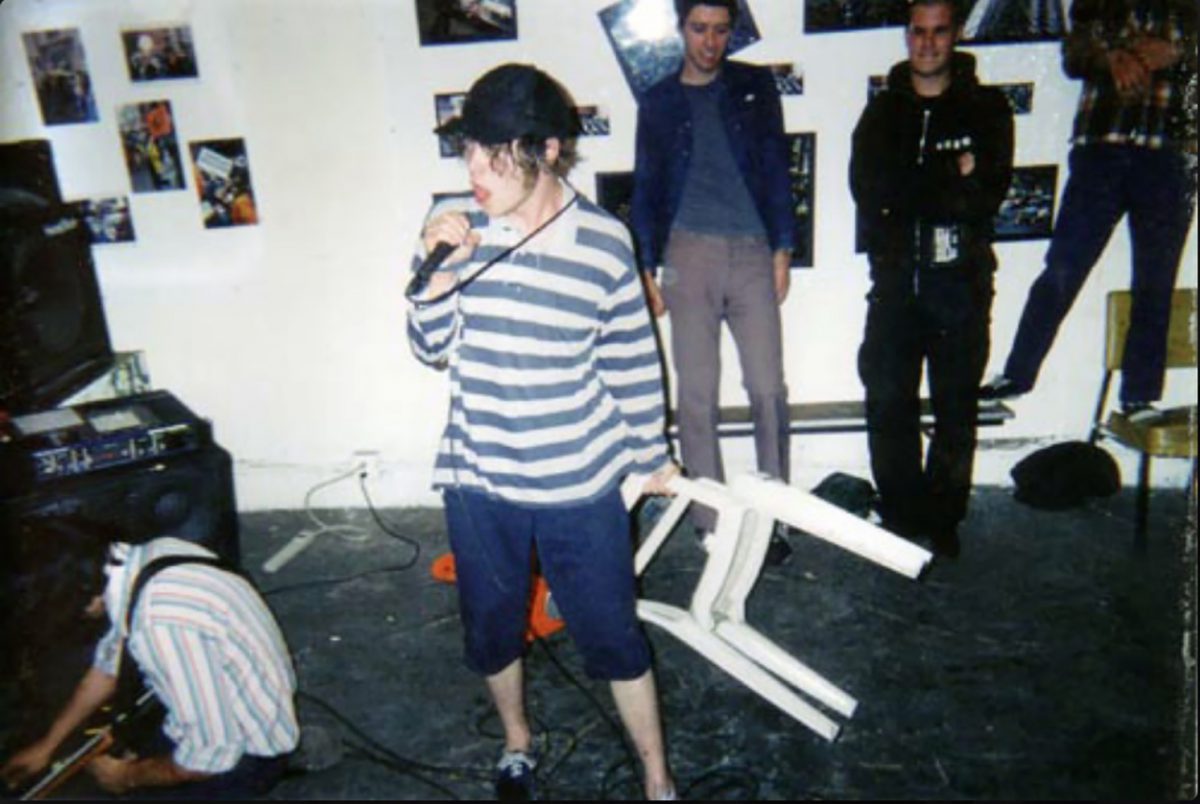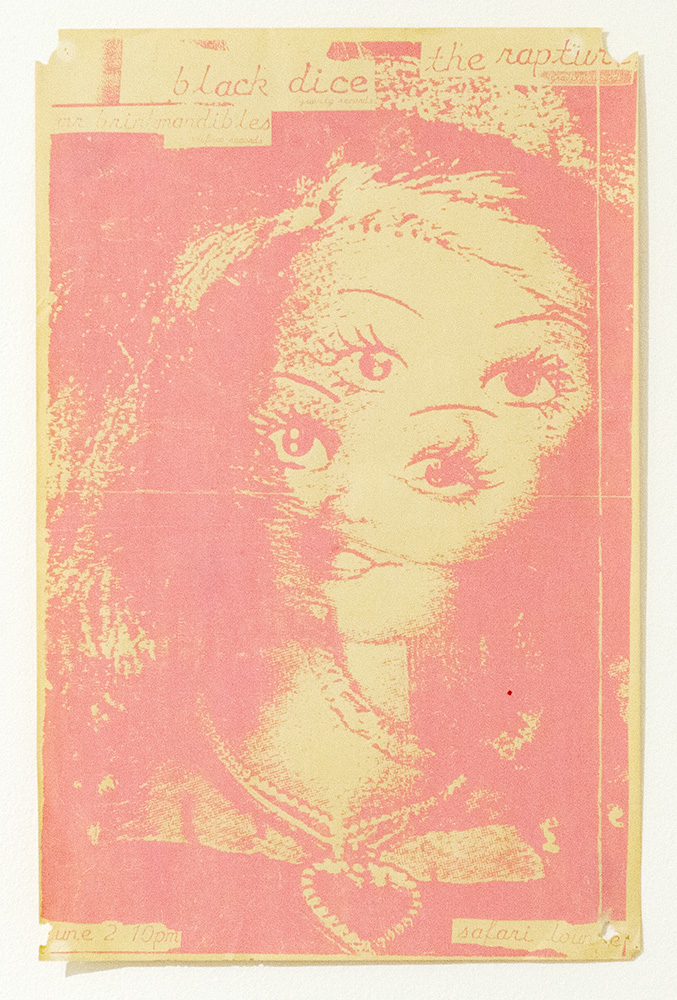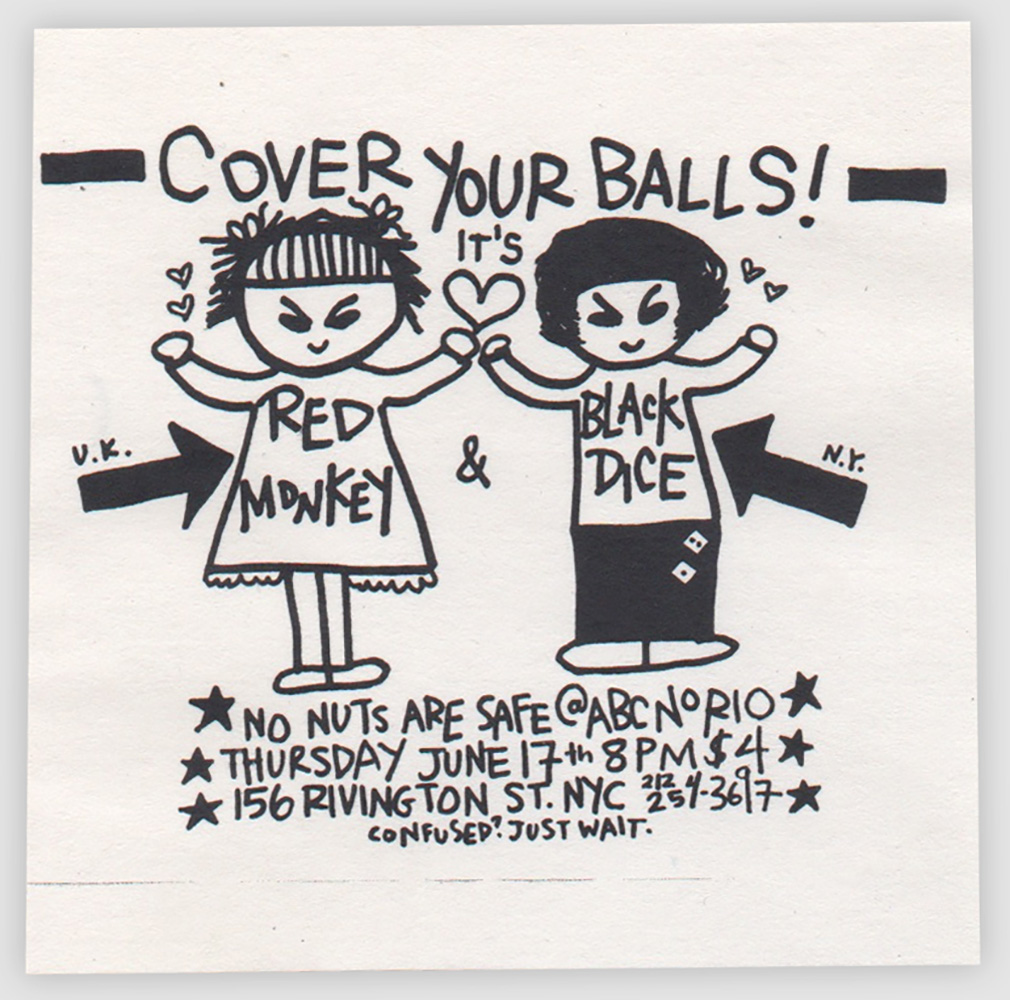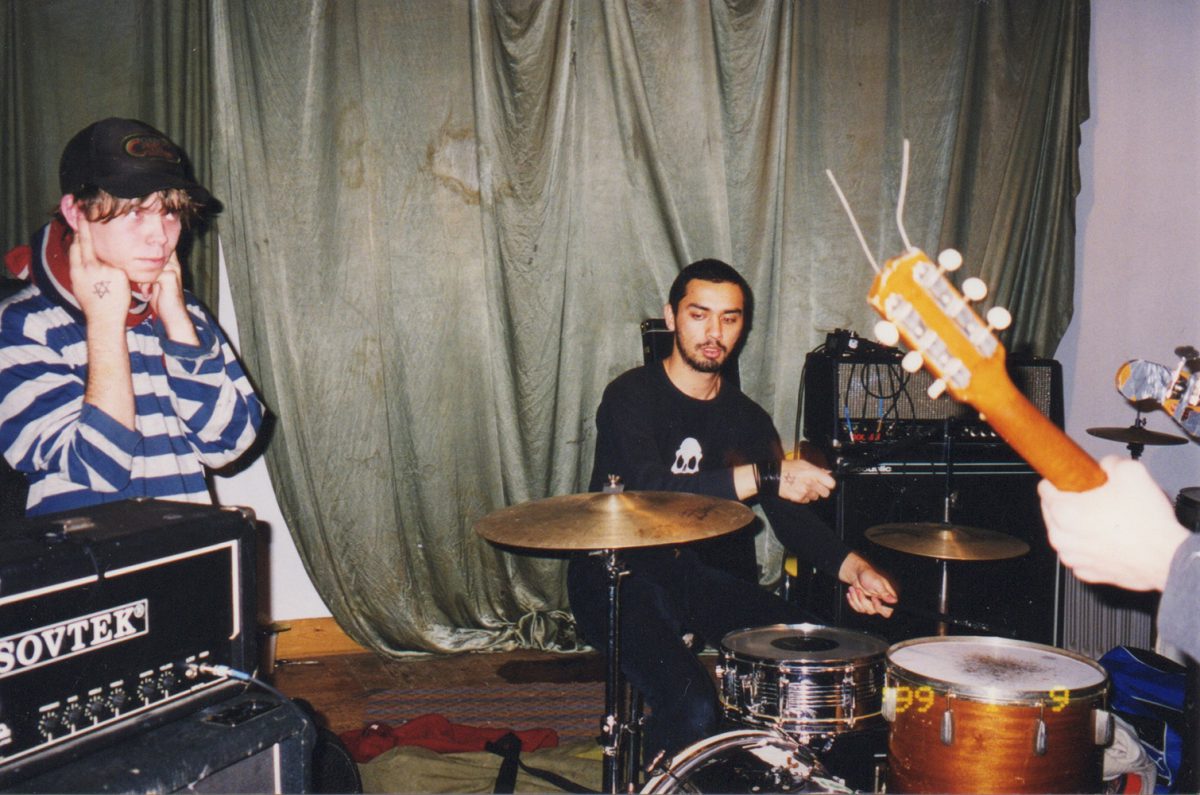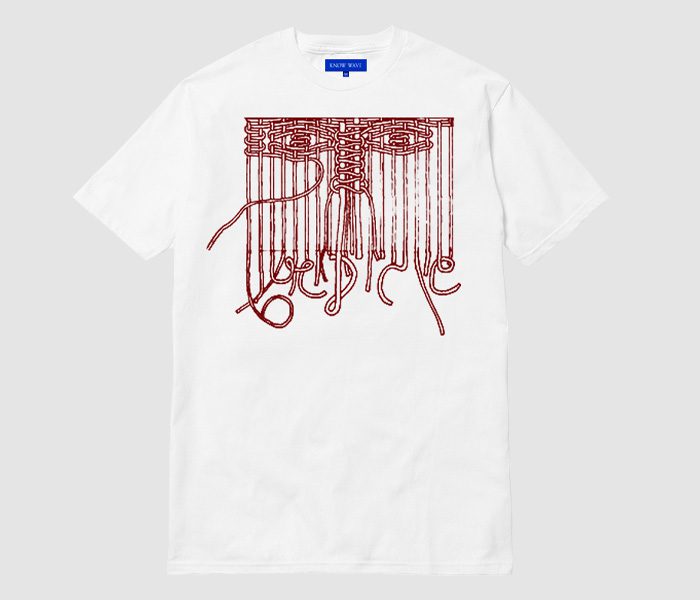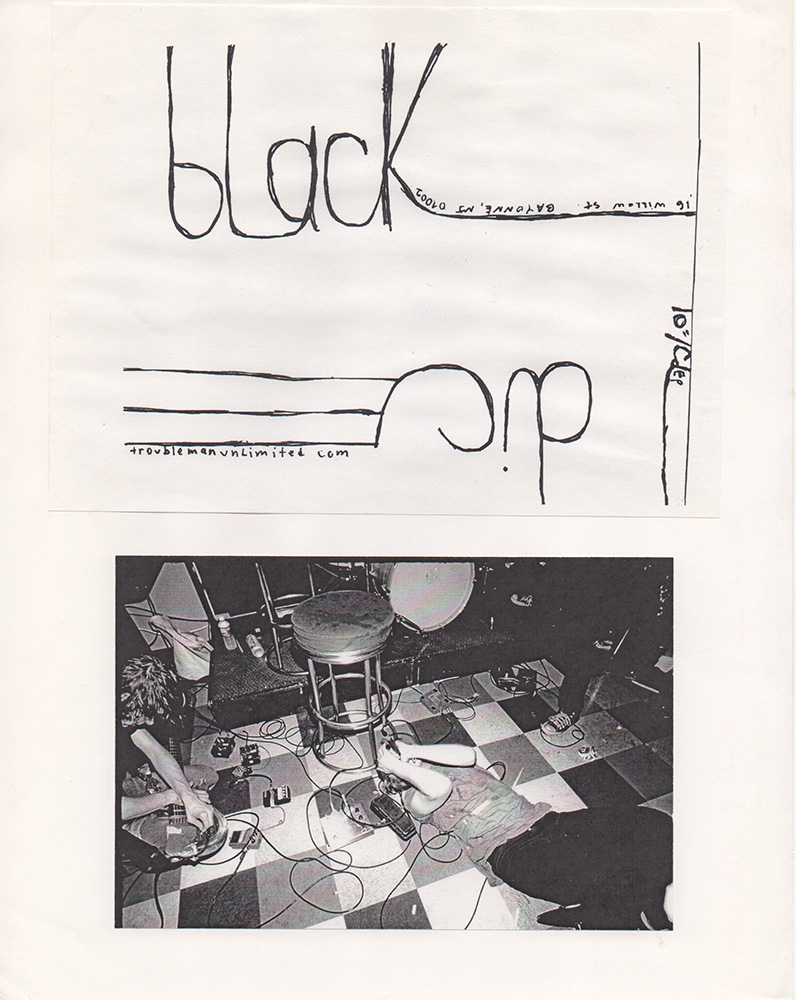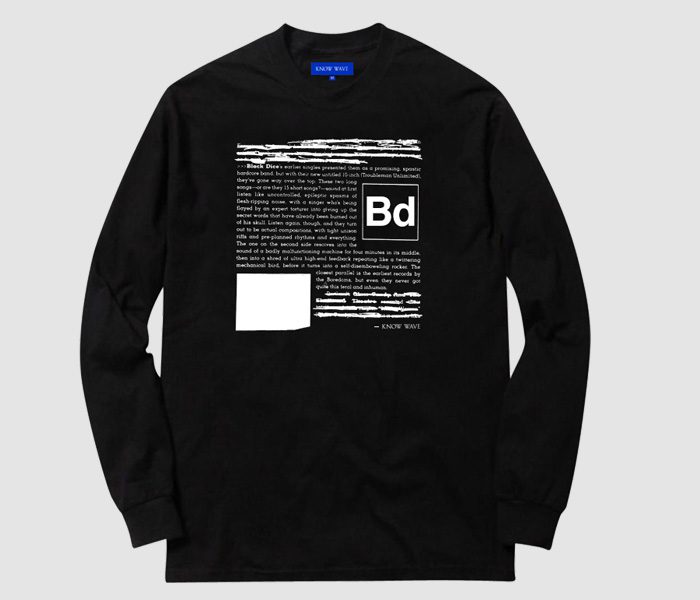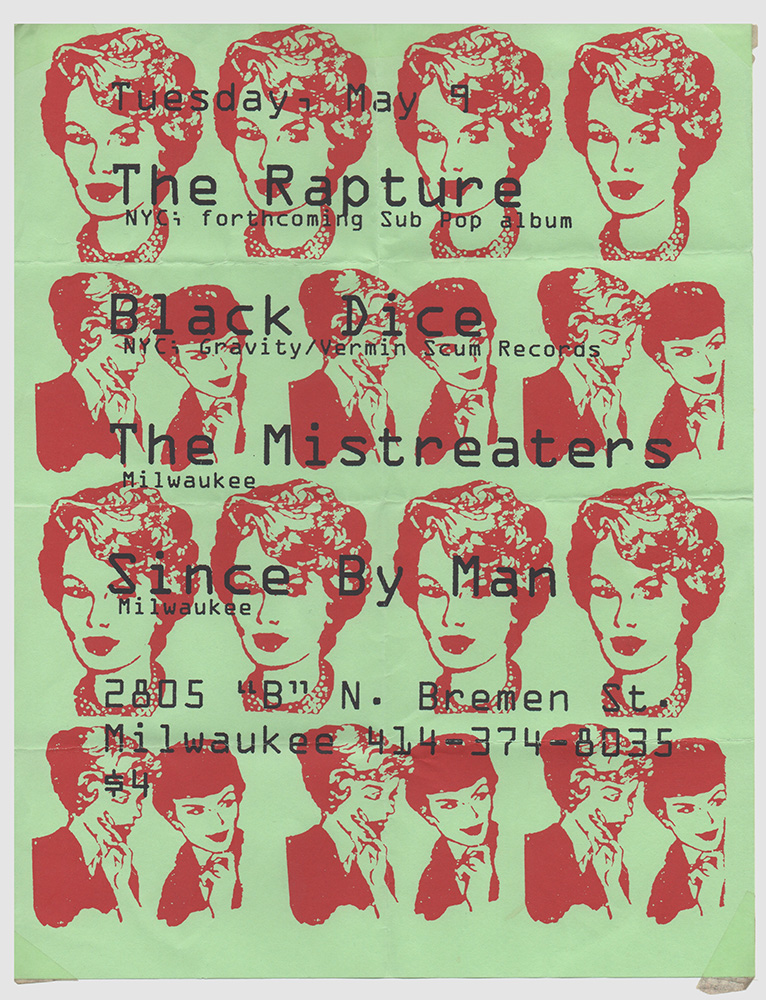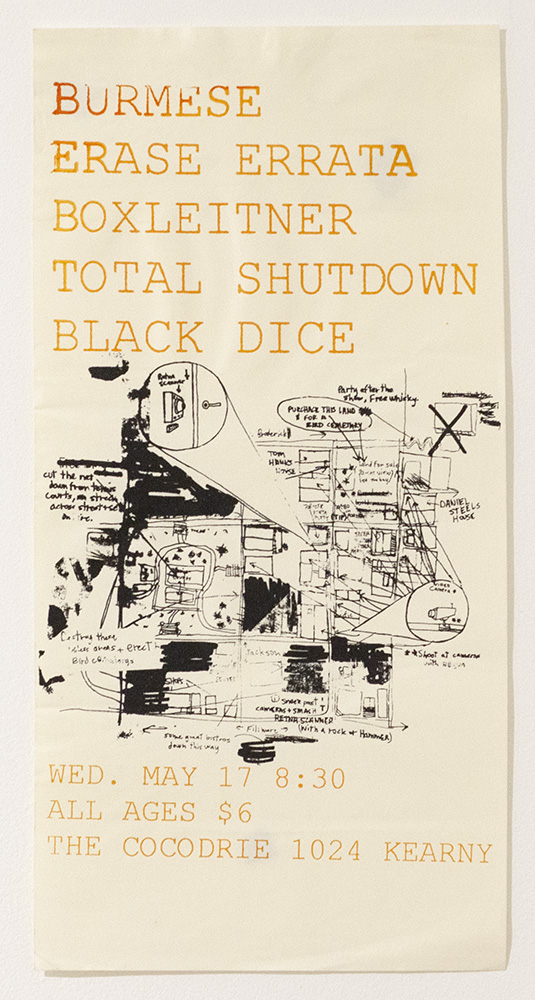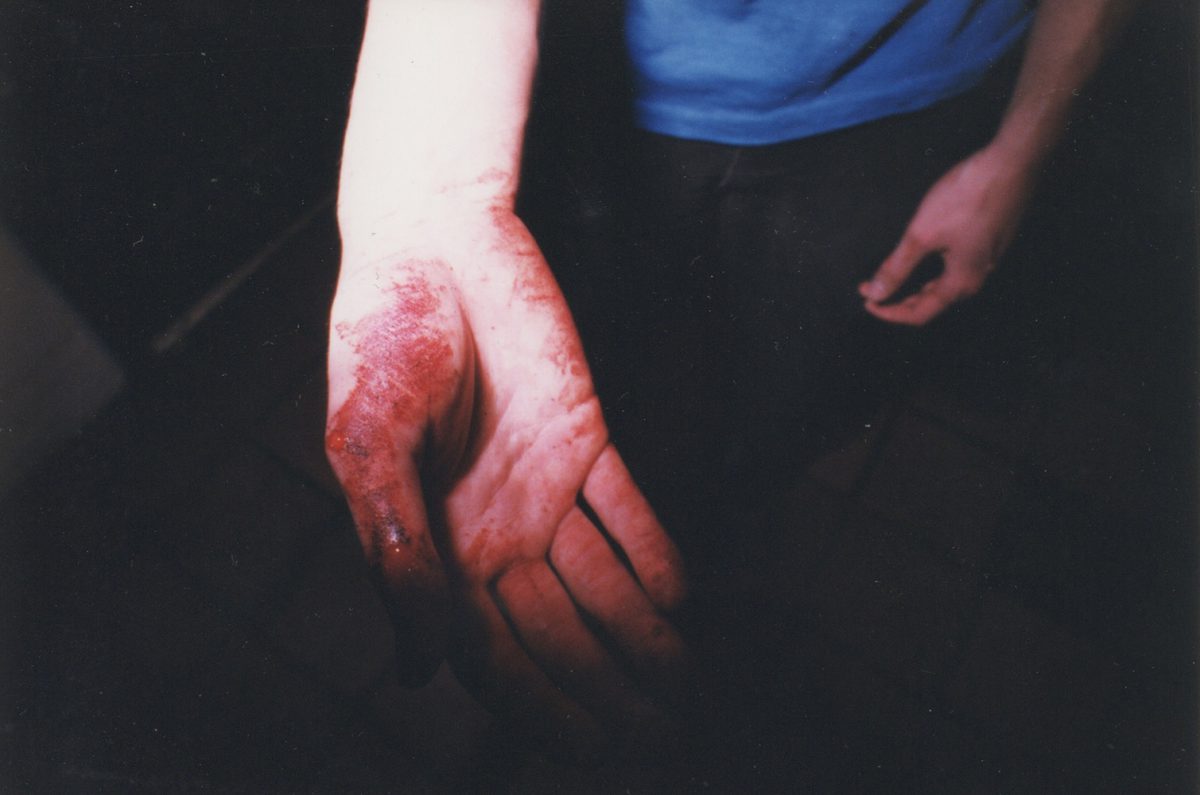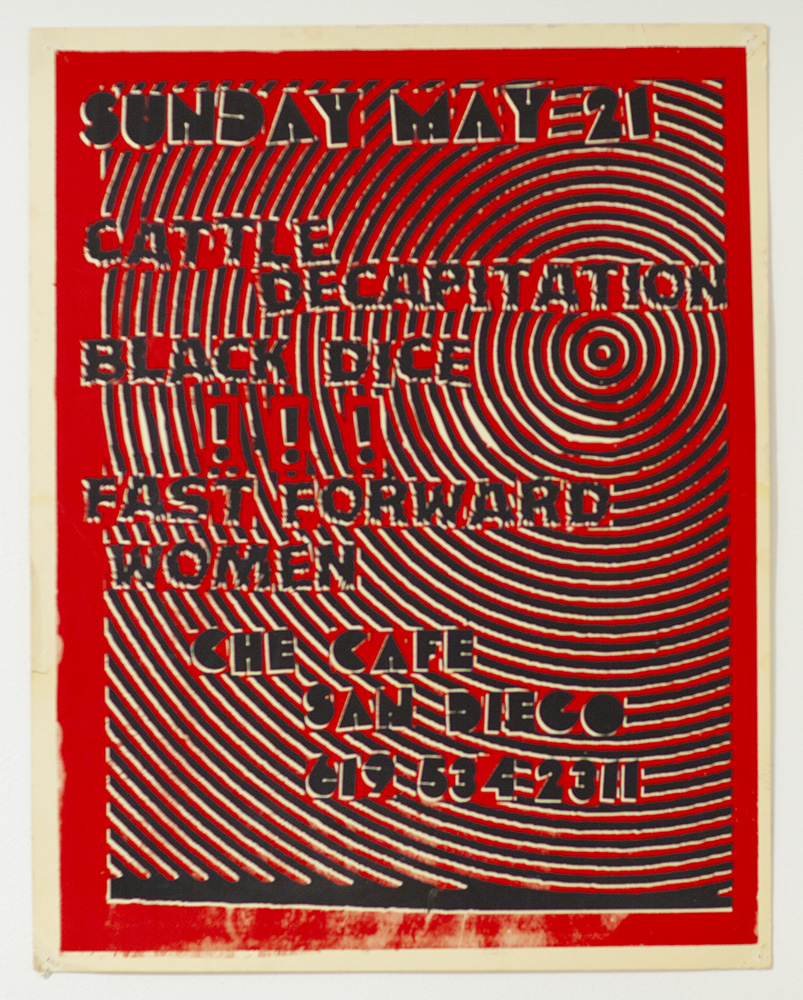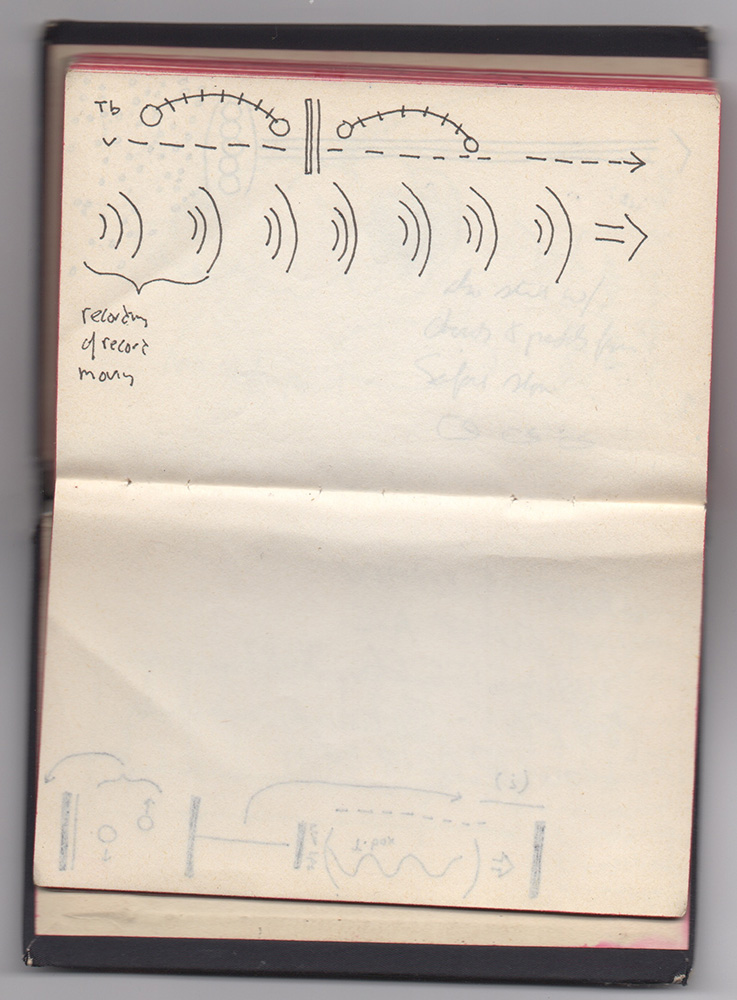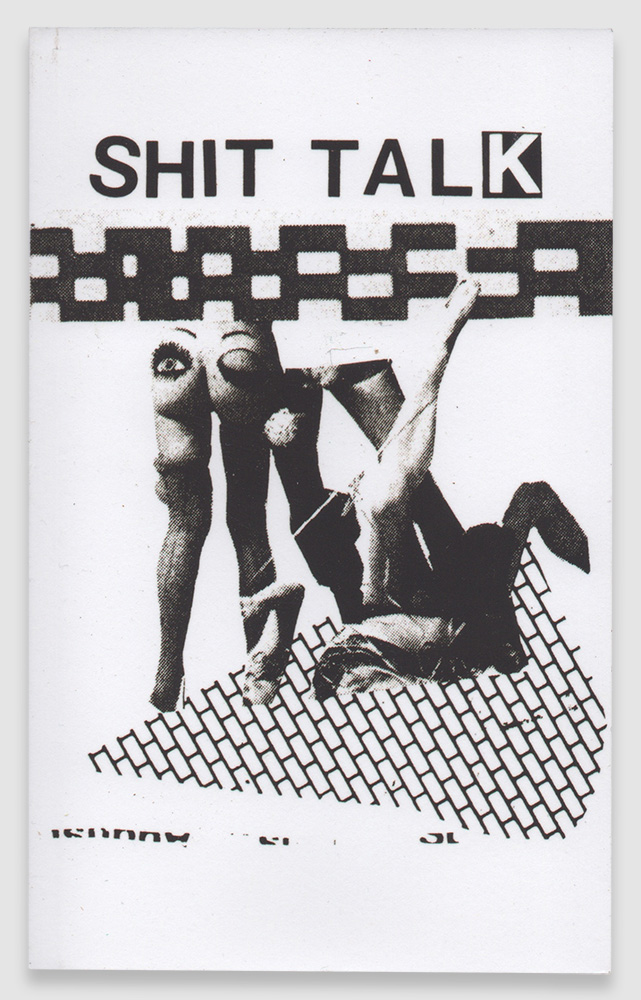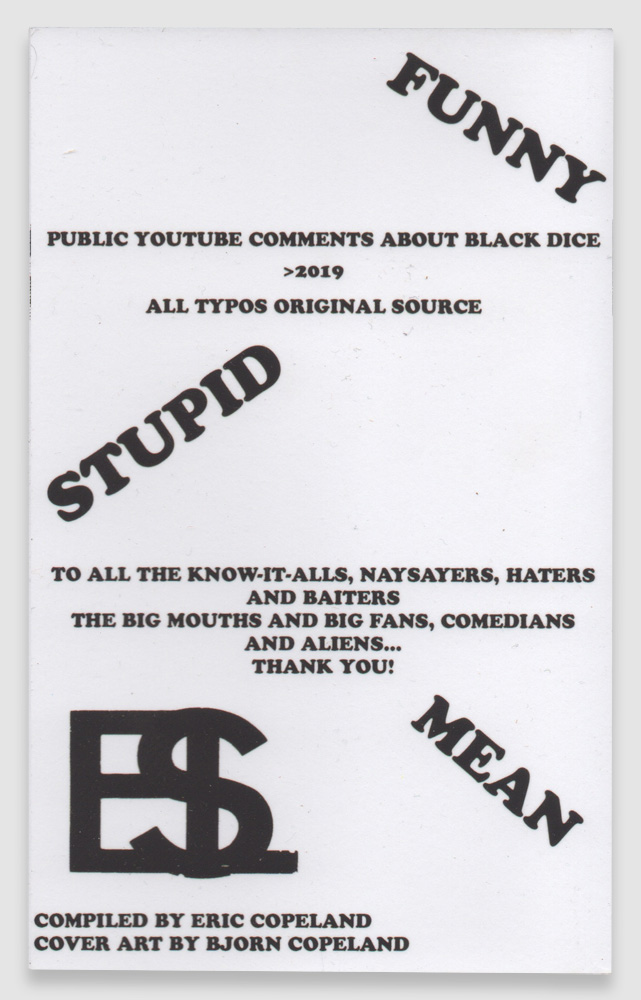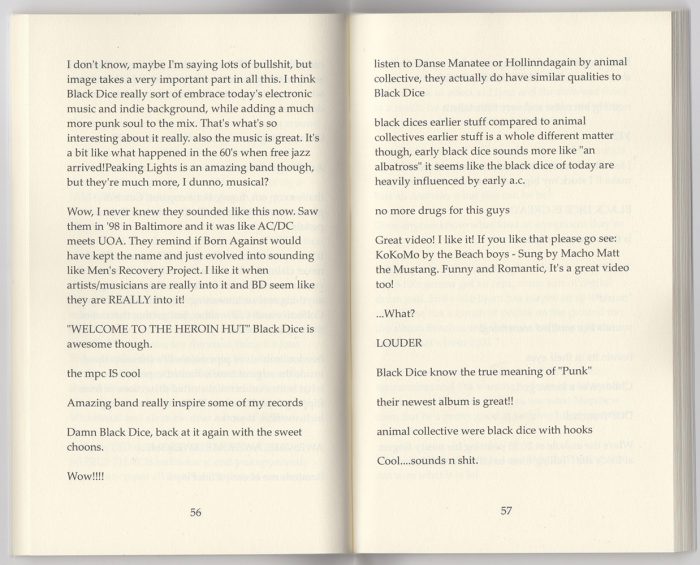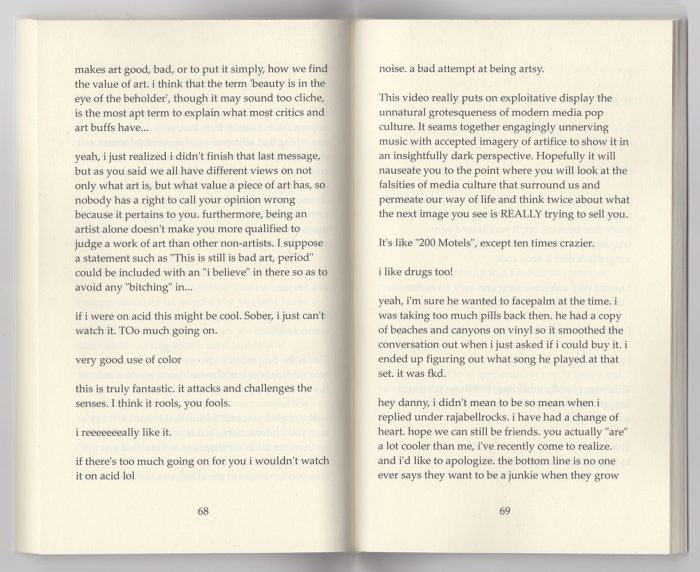
Over the past two decades, Black Dice have maintained a perverse dedication to uneasy, deeply vivid sound that touches upon conventions of hardcore punk, electronic dance, and noise music, but remains entirely their own. First encounters with the band are contentious, deliberately unstable, leading Dan Fox to describe it as “a music of acclimatization” in a 2003 Frieze Magazine profile, going on to say, “Black Dice are not a band you would choose to listen to if you were feeling even remotely fragile.” Listeners that push through this challenge find themselves deeply rewarded, and the band’s visionary structure and presence has affected countless artists. Noah Lennox of Animal Collective once stated, “I modeled the way I approach everything with the band watching the way Black Dice did it.”
The germ of Black Dice was formed at the Rhode Island School of Design in 1997, by students Sebastian Blanck and Bjorn Copeland. Joined by Brian Gibson on drums and Bjorn’s younger brother Eric, they played their first shows in 1997 under the name Spit On Your Corpse. After local shows, a demo tape, and a name change to The Clutters, the band decided that Gibson wasn’t the right fit and invited fellow RISD student Hisham Bharoocha to play drums, finally changing their name to Black Dice. Sebastian quit in early 1999 and was replaced by Aaron Warren. Hisham left the band in 2004. The trio of Bjorn, Eric, and Aaron continues to play as Black Dice today.
For this review, Know Wave takes a close look at the very beginnings of Black Dice, spanning 1997-2000. This chapter of the band is best remembered for their furious, barely controlled live performances, which sent members of the band and the audience to emergency rooms. Their squalling, thrash-influenced sound will come as a surprise to listeners only acquainted with their more recent records, and critical discussion of this era often associate the screaming and feedback with adolescent rage. A present-day reflection on this era reveals the foundation of the antagonistic brilliance that has served the band for twenty years. Told through new interviews, archival footage, show posters, photographs, and the band’s own notebooks, we reconsider the impact of the deeply creative and deeply divisive beginnings of Black Dice.
Hisham Bharoocha
Sebastian Blanck
Bjorn Copeland
Eric Copeland
Aaron Warren
Matt Anderson
Dave Auchenbach
Rob Baum
Cundo Bermudez
Paul Costuros
Aaron Dilloway
Chris Dixon
Jen Hate
Jeff Khonsary
Alex Maciel
Doug Mosurock
Nic Offer
Todd Patrick
Andy Puls
Anna Schachte
Molly Schnick
Mike Simonetti
Andrew Taylor
Ben Valis
Brian Weitz
“Even if we made some half assed attempt to emulate the type of music or bands that we were into, it just was inherently going to come out a little deformed anyway. I mean, we’re like fucking professionals at shooting ourselves in the foot. To a comical extent. You do the best with what you’ve got.” – Bjorn Copeland in a 2019 interview with Know Wave
“I’d known Bjorn and Sebastian since probably day 2 of college because, of course, Bjorn was wearing an indie rock shirt. I won’t name it just in case he might be embarrassed. I thought they were cool, but I also they were more into like, twee indie stuff. In 1997 there were all these weirdo noise rockish bands happening in Providence, and Bjorn and Sebastian had this thing called Spit on Your Corpse with Brian Gibson on drums. When I heard it I was like, ‘oh shit! This is awesome. It’s so cool that they’re playing this heavier music.’ I think Gibson was being flaky about playing, and they were like, ‘we want to not play with Brian anymore, it’s kind of a pain. Would you be up for joining?’ I wasn’t a trained drummer or anything, I grew up playing bass because of Cliff Burton, because I thought he was so cool. And I always wanted to play drums, but in Japan I didn’t know that was an option, I was just doing everything on my own. So I was like, ‘yeah, I’m totally down.’” – Hisham Bharoocha in a 2019 interview with Know Wave
“There was so much going on. Six Finger Satellite had a very specific presentation, Landed were pretty crazy. Dan lit himself on fire at one show. People were trying to push what you could do. Forcefield was dressing up. I think that we liked the idea of being nice indie kids and then letting that be the visual. That people would expect us to play in a certain way and then we would totally blow that up. We were going to shows all the time and seeing bands that were writing great pop songs, or great rock songs, and being thrilled about that. I think that, in some ways, if we could have done that, we probably would have done that. But we couldn’t, so we worked with the means that we had.” – Sebastian Blanck in a 2019 interview with Know Wave
“Those guys were looking for a good band name, we wanted something tough sounding. Naturally I asked Devin Flynn, was there any heavy New York things? Graffiti things? He was like, ‘there was this guy who used to write Black Dice as his tag.’ He had an image of it and I was like, ‘shit, that’s the best band name ever.’” – Hisham Bharoocha in a 2019 interview with Know Wave
“Here’s what I remember: Their set lasted about 10 minutes, maybe less. About 30 seconds after they started, Eric threw a folding chair at my legs. Anyone who stepped into their perimeter was physically attacked. Joe, the frontman of The 1985, got shoved by Sebastian during the set. When he pushed back, Sebastian, Bjorn and Eric swarmed on him. I believe in the melee Joe may have kicked Bjorn in the balls. At the end of the set Eric picked up the cinderblock that was holding Hisham’s kick drum in place and dropped it on the vocal mic, netting him a very stern talking-to by the owner of said mic about treating other peoples’ belongings with respect.
Because of the smashed mic, and the low attendance, I lost something to the tune of $220 on this show. Despite it all, and despite bands barely getting gas money, spirits were high after the sets. Bjorn had approached Joe and said (and I’m paraphrasing here) ‘hey man, thanks for responding, you kicked me in the nuts, that was real’ and Joe may have told him to fuck off. For the remainder of my time in Pittsburgh (roughly 18 more months) I feel like my reputation as a promoter of bands was somewhat tarnished because of this show. Friends with whom I’d built trust in recommending bands were now doubting my taste.” – Doug Mosurock in a 2019 interview with Know Wave
Doug Mosurock organized a show for Black Dice, The 1985, and Baby I’m a Star at the Millvale Industrial Theater in Pittsburgh in the summer of 1998
“I knew about music but I had no idea how to do it. I didn’t realize the rate that someone was counting off was going to set the tempo for the fucking song. I thought you started at the same time, and played at the same speed, and then ended at the same time, and that was playing together. It didn’t occur to me that you could play in time to a beat, actually timing a note or a chord so that it lined up with a specific drum. It just didn’t. I think a lot of that influenced why it sounded sloppy and seasick. But in the end that seemed more fun anyway.” – Bjorn Copeland in a 2019 interview with Know Wave
“I think sometimes you just have to take pride in whatever cards you’re dealt, like the fact that we could put on a show where people wanted their money back. We did try to do stuff to make people question their involvement in being at a show, and we certainly did stuff that I would find offensive if it was done to me. I don’t want to be punched at a show, or have someone throw something at me, or have someone wrap a mic cord around my neck and drag me across the ground. Eric would do that kind of crap all the time. His go to move, eventually, was he bought a really long mic cable, a 30 foot one or something. And he would crawl around on the ground, around people’s legs and then stand up and run in the opposite direction so a bunch of people lost their balance and fell down. But you know, eventually people started expecting a certain sort of bad behavior, and that didn’t seem exciting anymore. Especially because you started getting hurt, really hurt.
I think having a reputation of being sort of scary, that was a new feeling for us because we were all slight, pretty androgynous little kids who were still light years away from shaving and stuff like that. That actually felt like, being acknowledged as like an adult man or something. That’s probably problematic to talk about now, but there were certain models that you grew up with about what a band is, and what a band dude is, and so it just seemed better to have a reputation as being kind of dangerous.” – Bjorn Copeland in a 2019 interview with Know Wave
Black Dice performing in Chapel Hill, NC, 1998 (excerpt)
“I feel like we were kind of the first of our friends to tour even like in a small way. And to me, I never knew about the rest of the country’s independent music stuff besides like Olympia and DC. Other than that, I didn’t know what’s in San Francisco or San Diego, you know. I don’t feel like we were ever that informed. We were having fun, you know, like drinking and going out and meeting people and stuff, but I always felt like we were kind of figuring out what else was going on. And I feel like a lot of other places seem like they knew what was going on. You know what I mean?” – Eric Copeland in a 2019 interview with Know Wave
“The other bands that we were associated with in Providence were musically far more accomplished than we were capable of being at that point, but you wanted to be on the same playing field as Lightning Bolt, or Landed, or Forcefield, or Arab on Radar. All of them seemed like grownups to us! Even though some of them were only a year or two older than us. But they fostered something, or nurtured something special in Providence, like with the types of bands that they were forming, and the venues that they were setting up to do these shows. And then you realize it didn’t really exist anywhere else in the country. I mean, maybe Detroit and San Francisco there were these oddball pockets, but mostly we played in hardcore clubs.” – Bjorn Copeland in a 2019 interview with Know Wave
“I can’t remember who Bjorn was listening to, but we were hearing stories about other hardcore bands. I remember that he’d heard when Antioch Arrow played, it looked like the guitars had engines, jet engines on the back. So it was like, ‘oh, that could be fun.’ And it just kind of led to this idea of the guitar being something uncontrollable. Also, Eric was really putting himself in a risky situation. Bjorn had to concentrate a little bit more on actually playing the notes, and Hisham was obviously behind the drum kit. So I could made sure that Eric wasn’t the only target. I would not call myself a bodyguard, but another target. So people wouldn’t just beat him up if he went too far, they could also beat me up. He beat people up, and I got beat up. I’m sure he’s got stories of shit that happened, but I also got punched in the face, had a trash can thrown at me, had a bottle thrown at me, by Eric, that hit me in the face.” – Sebastian Blanck in a 2019 interview with Know Wave
“That’s funny, the first note that they hit when I saw them play, it was that sound, like a high EEEEEEEEE and Bjorn just kind of threw his guitar, but it was strapped to him and he was still playing it, and it seemed like it was dragging him across the stage straight, like a bowling ball, just like straight into Eric.” – Brian Weitz in a 2019 interview with Know Wave
Brian Weitz first saw Black Dice at NYU in 1998. As a member of Animal Collective, he has toured with Black Dice many times since 2001
“I feel like the performance stuff started getting weirder the more we did it, probably because once the audience was sort of hip to the game it kind of changed the rules a little bit. And you know, you’re just growing out of it too. But for the most part I feel like when you’re playing house shows or shows that size you’re not confronting, like, adults. You’re confronting kids and they’re kind of as open to shit as you are. I don’t ever remember it like getting out of hand in a way that was dangerous or the police came or something. There were situations that were beyond our control but the kids at the show, I feel like they were kind of psyched, you know, the kids like us. It wasn’t the hardest sell. You’re still kind of getting by on just some surprise and youth and stuff like that.” – Eric Copeland in a 2019 interview with Know Wave
“In the beginning we were playing shows where we’re still booked with like, you know, hardcore-ish bands and they’d have their arms crossed as we always assumed they would. And we just played like the loudest thing ever and nobody would say anything to us, but we’d be like, ‘that was a pretty good show!’ I remember certain shows where we were really trying to push the boundaries. You know, what could make people uncomfortable and kind of keep people on their toes. They couldn’t just stand back and expect like a nice little show.” – Hisham Bharoocha in a 2019 interview with Know Wave
Black Dice performing in Greensboro, NC, 1998 (excerpt)
“I remember a bad one around that era was in Phoenix. Everyone was really nice to us when we showed up. We started to play, and like the guitars just fed back the whole time. This dude was like, ‘you know if you turn that down it won’t make that sound.’ And everybody in the audience laughed, which was probably 20 people or something like that. I think we were just checking everything, and then he asked me if I’d ever played that thing before, meaning the guitar. And everybody laughed. And then at the end of the show, everyone who had offered us a place to stay withdrew those offers and the promoter came up to me and was like, ‘it would be a better idea, and make everyone happy, if you just left town tonight.’ I should’ve just seen that as a victory in this one way, you know? Fuck these fucking squares.” – Bjorn Copeland in a 2019 interview with Know Wave
“I took an 8-track tape machine over to their practice space, a pretty minimal set up. I don’t remember how long it took but it was definitely not all in one day. I think they really did have a hard time playing together at that point. I had a lot of patience but I had to leave the room at one point because there was a song that they just kept doing over and over but they couldn’t get, that they never did get. I remember it being cold and rainy in there, not the best. Hisham was probably the most competent in the band at that point, as far as holding it together. I think they really wouldn’t have been able to even make that first single without him. I know around that time there was going to be this party and they were going to do a Black Sabbath cover band and they quickly gave up that idea when they realized they couldn’t play any of the songs.” – Dave Auchenbach in a 2019 interview with Know Wave
Dave Auchenbach recorded the Black Dice records Lambs Like Fruit, Number 3, and a self-titled 7”
“Feedback was a normal sound in the Providence scene. It was definitely uncontrollable, but you could still mess with it rhythmically. With a lot of control, actually. Not necessarily in terms of the notes that you’re getting, but you could start creating patterns. And that’s really like the basic way that we started doing it. I think there was a show in Vancouver where Hisham and I played for an extra 20 minutes while somebody was talking to Eric outside about how pissed they were at him for like, doing something.” – Sebastian Blanck in a 2019 interview with Know Wave
Black Dice “Synapse Synapse” (remastered). Originally released on the Black Dice 7” Lambs Like Fruit, 1998, reissued as part of the Natty Light LP, 2019
$20
Order Now“On the first tour or two, you know, we could kind of get shows just because we had a record on Gravity. Like no one had that record, but it was enough that like, whatever Indiana town could put you up at a show for like 30 people.” – Eric Copeland in a 2019 interview with Know Wave
“I booked two shows for Black Dice at this DIY venue I used to run called The PCH which was right here in the South Bay. Somebody would call me or send me an email and be like, ‘hey, we’re going to be in town. Here’s our tape.’ But Black Dice, they had a 7” on Gravity, and I was all about Gravity, like every freaking band that was on that label was one of my favorite bands. So as soon as I saw that, like, ‘holy shit, these guys are on fucking Gravity, hell yeah we’ll do a show.’” – Alex Maciel in a 2019 interview with Know Wave
Alex Maciel organized two DIY concerts for Black Dice at the south Los Angeles venue, The PCH
“Running a DIY venue when you’re 16 is a learning experience but 99% of bands (literally actually every band other than Black Dice) always were kind and deferential and realized the space was always in danger of being shut down and were just like totally friendly, helpful, awesome, anything they could do to help they would. Every band was at least cordial. This was the first time I had a band on stage that was adversarial and I did not know what to do or how to feel. Black Dice start their set amid a mad rush of 4 bands still loading their gear in. I’m not stoked about this but what can I do? During their set that singer whips the mic all around, into the floor of the venue, really pummeling it. It was a Shure SM58 and by the end of the set the normally spherical silver guard was dented and smashed into some unrecognizable 17-sided polygon. The mic was toast. So was the cable. We only had three mics total, now we are down to two. Indefinitely. Everything is borrowed. What the actual fuck? Over the 18 months of the Small Intestine, there were many moments of joy, more joy than I have known in much of my adult life. Sure there were shows that were duds, and worrisome crowd surfing maniacs and power outages but Black Dice were the one black mark that just I never could find any humor or value out of their whole deal. About a year goes by, and I walk in to my local punk record store and the owner is like ‘are you the ‘Kid from Baltimore’ Black Dice devoted an entire half of their record insert to taking shit about?’ I was like ‘What?!?’ And he read to me their dis or whatever in their Gravity Records 7” liner notes. I still have never read the liner notes myself and I carry the torch forward into the future… Fuck Black Dice and the horse they rode in on! Fuck Black Dice!!!” – Ben Valis in a 2019 interview with Know Wave
Ben Valis founded and co-ran the DIY venue the Small Intestine in Baltimore, Maryland
“We played in Las Vegas in some crazy, I don’t even know what it was. It was just a concrete square in the middle of nowhere. It seemed like people were excited, and people were having fun. That’s what you want from any show! In a weird way it’s the same criteria that makes any show a fun show. But because there would often be mishaps, that wasn’t always necessarily going to happen. We were setting up that challenge for ourselves and for our audience. One of Eric’s, I think his roommate from college, was with us at that show, and somebody did something to Eric while we were performing and his roommate went over and bit the guy in the chest.” – Sebastian Blanck in a 2019 interview with Know Wave
“Hisham put a pitch shifter on his kick drum pedal at the show, which I remember was one of the things I liked about it. Like, ‘oh, this isn’t a hardcore band.’ They frightened me, but I remember Hisham testing it out and thinking, ‘this is going to be some weird industrial thing.’ If I bring that up to those guys now they’re like, ‘oh yeah, none of us wanted him to do that. We’re all still angry at him.’
The following summer I was just becoming friends with Karl Bauer and I think he invited me to this party, just downtown somewhere. I saw Eric coming down the stairs or the hallway to leave the party as I was coming in. Eric is a pretty fast walker and he was moving, you know, with purpose, and I just gave him a wide berth because of his behavior at that show I’d seen. I didn’t realize it was part of the show. Like the band had been bickering about the kick drum pedal, and they weren’t violent with the audience because the audience kept their distance, you know. It was a pretty under-attended show so they mostly beat up each other. And I just figured I was watching a band break up, like playing their last show.” – Brian Weitz in a 2019 interview with Know Wave
“Black Dice would play off the audience. The shows were similar in that they sort of would start off antagonizing, and really being physically threatening towards the audience, and depending on how the audience reacted they would then react. So if the audience fought back, they would continue fighting, if the audience moved out of the way, which happened more often than not, they would, you know, keep doing what they were doing. But if someone in the audience was willing to escalate, either in a joking sense, or accidentally, they would then escalate. They made it super personal, which other bands wouldn’t do, like you really felt like they were going after you. Like for some reason, like, ‘why me? What is it about me?’” – Rob Baum in a 2019 interview with Know Wave
Rob Baum traveled with Black Dice and Baby I’m A Star on part of their Summer 1998 U.S. tour
“They had sent me a demo of their band called I Spit On Your Grave and I liked them a lot. I would never tell a band to change their name, but I said that I just couldn’t put out a band with that name. They ended up writing me that they were thinking of changing it anyway. That name is actually kinda cool too and I liked the band a lot but Gravity had a sort of aesthetic and that name did not fit… I just let it be known to them that the name was a little much for me and they said they were changing it anyway. Black Dice is a really good name so it worked out.” – Matt Anderson in a 2019 interview with Know Wave
Matt Anderson founded Gravity, the San Diego based record label that issued Black Dice’s first 7”, Lambs Like Fruit in 1998
“It was around the time when, like, all of the rules of punk had become such rules. I think certain people were excited by the rules and then certain people were excited by different things, and we were definitely excited more by the do-your-own-thing kind of vibe. Do what you want to do and in doing that you will find the way. And I felt like Black Dice were more in line with that too, you know? They thought the rules were stupid, we thought the rules were stupid.
Everyone in punk all have the same answers, and we were like, kind of trading the same answers back and forth and that was kind of boring. And then here were these guys doing things that are like, maybe they aren’t okay, and there would be shows that would almost be too violent. They pushed it a little bit, but it was kind of more exciting and more interesting than all these other nice people.” – Nic Offer in a 2019 interview with Know Wave
Nic Offer was a member of Outhud, who toured with Black Dice in the winter of 1999
“We weren’t similar sounding bands, especially at the time. We saw them play and we just got along so well, I think we understood where each other was coming from, musically and personality wise. It was always refreshing, you kind of were in your own little scene. We were from Sacramento and we thought we were the only ones sort of doing weird stuff, figuring out the limits of what people would expect from this formally punk scene. With Outhud, and I think Black Dice had some of the same feeling, is that you roll up to the show and no one knows what to expect. And you can imagine you’re blowing their minds or something. With Black Dice, you didn’t expect this little dude to get in your face and get in a fight, but he did.” – Molly Schnick in a 2019 interview with Know Wave
Molly Schnick was a member of Outhud, who toured with Black Dice in the winter of 1999
“The way Bjorn played guitar then, I’ve never heard anyone do it that way. Watching him do it, like he doesn’t understand. His right hand, his rhythm hand, he can’t do a rhythm. You know, he can’t strum. It’s challenging in this one way, but I don’t know anybody who makes the stuff he makes the same way, you know? I think he’s a hard person to emulate.” – Eric Copeland in a 2019 interview with Know Wave
“When they came to play the Che Café I was asked how I could support them because they were supposedly offensive and the guy was comparing the singer to GG Allin in a way. I said I did support it. I think the person complaining to me was offended that the singer would pull his pants down and put the mic on his butt. I really don’t know. I didn’t see him do that at the show but I think he broke the mic by throwing it on the ground and that pissed the guy off too who was from the Che. He was saying that Gravity should not be supporting bands like this but the guy was pretentious etc. and I just said something like ‘whatever, man. I like them.’ I was fading from the scene at that point and in a different place and wasn’t very concerned at what he thought, or if breaking a mic was going to hurt the DIY scene because the Che had to replace the mic. I understood what he meant, and yes it’s not cool to break a mic of a small venue with a small budget and all.” – Matt Anderson in a 2019 interview with Know Wave
“When I first met them, getting up to the venue, they were the nicest, sweetest guys. All smiles, you know? Despite the fact that they’re from New York, that little bit of New York intimidation. But when they got there they were so nice and just chill, just like everybody else. I was like, ‘it’s going to be a great show.’ And then the second that they started playing, holy shit dude. It was like the beast came out. You know what I mean? They had this threatening intensity, a scary intensity. They were swinging their arms. It wasn’t a big show, the first time they played. I would say about 30 or 40 kids and everybody was close to the stage when they started, and by halfway through the first song the whole room was cleared out. And not as far as people leaving, everybody was literally against the wall just trying to get out of their way. By the time they were finished playing, their instruments were pretty much laying all over the place. And I do remember, the snare drum rolled all the way to the back and ended up halfway inside our restroom which is all the way in the back of the room.” – Alex Maciel in a 2019 interview with Know Wave
“I was in a band whose first keyboardist had gone to the Rhode Island School of Design, and she had known the drummer of Black Dice, Hisham. Upon her recommendation of their crazy live performances, a number of my friends and I attended that show to see them. The drummer kept hitting the inside of his forearms, hard, as if punishing himself. The rest of the band was as animalistic and menacing. They seemed to have collectively and telepathically decided that this show was the time to destroy their instruments, and did so in a violent fashion. After this happened, they seemed to all come to at the same time, realizing they’d wrecked their gear, on tour in California from Rhode Island. The singer mumbled ‘We’re Black Dice from Providence, let us know if you have a garage we can crash in.’” – Andrew Taylor in a 2019 interview with Know Wave
Andrew Taylor attended Black Dice’s 1999 show at The PCH, Los Angeles
“It was reminded to me, earlier, I had to stop the guys in the band from breaking bottles. I believe it was actually behind the club, not in front of the club, which is actually worse because it was closer to our neighbors. I was just like, ‘you can’t do this.’ And they did the silent treatment. Which, at the time, was indicative that these guys were taking punk attitude to a totally new level. It was like meta that they pretended to be socially inept or incapable of understanding. Blowing me off at a level that I had not yet experienced. People usually would just tell me to fuck off.” – Todd Patrick in a 2019 interview with Know Wave
Todd Patrick was the founder and organizer of 17 Nautical Miles, a DIY venue in Portland Oregon that hosted a Black Dice concert in 1999
“We had gone through a lot of troubles with crazy neighbors, and with reasonable neighbors being driven crazy by our people. I was always worried during these crazy punk shows where kids were going insane that the police would show up and be like, ‘this is absolutely not okay, we’re shutting this down immediately.’ So the fact that it was over very briefly, I was thankful.
The one aftermath that I recall is just that the place was sweaty and dirty, but also they had shattered a guitar, which I didn’t personally witness. But we ended up taking somebody’s Gibson body and screwing it to the wall and it stayed on there for the remainder of the place operating.” – Todd Patrick in a 2019 interview with Know Wave
“I feel like we were just doing one body of work that for the most part Bjorn was designing. He would basically just come in and be like, this is a song. And it would be him chugging away at this line that then Hisham, and you know, Sebastian or Aaron, would figure out. To me it was just something that was like kind of dark and fun. It’s not really my personality, the darkness that I feel like we ended up going and finding. I mean, I like punk houses and stuff but some of them were really depressing to me. You know, there’s some kids who seem like they’re fucking lost out there, bad drugs and stuff.” – Eric Copeland in a 2019 interview with Know Wave
“At that time, at any show you’re going to play with some kind of emo band that’s very anodyne, pleasant sounding. You know, some quiet parts and some loud parts. And the spaces would be like, no stage, no good PA, and you’re on the same level as the audience. After a couple of years playing in this scene I started to be like, ‘this sucks, this is not what I’m into at all’ and it felt like the kids were not rebellious. So when I first saw Black Dice in January or February 1999, it was thrilling. It was actually dangerous, like I felt like I needed to keep my distance from the band. And not to glorify that, but there was something about the immediacy of that experience. It was irreverent and kind of nihilistic and that’s something I really responded to after being in this more wholesome and nurturing kind of punk community of the mid to late 90s.” – Aaron Warren in a 2019 interview with Know Wave
“I mean, it was pretty apparent. I was just talking to Sebastian about this the other day so it’s really clear in my mind. He was just done with doing those kinds of tours, he wasn’t having a good time. The music was changing. All the craziness of all our live shows was just organic, we just wanted to be as different as we could, while still maybe referencing the things that we liked. When we started, we’d do our seven minute set. And we eventually started wanting to engage the audience more, that’s why Eric started going into the audience and making people uncomfortable. It wasn’t, nobody wanted to hurt anybody or break anything but it just inevitably started to happen. So after we’d do our sets we’d just start doing a noise jam after the set. And I was like, ‘this part is cool! I like this part. This is new.’ And those just started to become longer and longer, and then we started wanting to write things that sound like that. And we started to lose Sebastian there. He just was not interested in that. He was more into the punk stuff. And that’s totally cool! So he like, just didn’t show up to practice one day.” – Hisham Bharoocha in a 2019 interview with Know Wave
“I was in one band before Black Dice, we were called T Tauri. We did the whole DIY post-hardcore kind of sound. My experience of doing the band was: it’s small, it’s hard, and it’s principled. And then basically one of the members of the band had a real drug problem and so at a certain point I was like, ‘I can’t be part of this anymore’ so I applied to go back to school as a way to get out of the band. We played our last show the week I was leaving Los Angeles and Jimi Hey came to the show. We were talking in the parking lot and he was like, ‘oh, when you get to New York, you should look up these guys in Black Dice.’” – Aaron Warren in a 2019 interview with Know Wave
“The idea of driving eight to ten hours to get to certain shows, especially on the west coast, and then playing for 15 minutes, was starting to really piss me off. I probably wasn’t as vocal about how I was feeling by the end of the second national tour I was just kind of, this is exhausting. I don’t know if they were surprised. I know that they were annoyed at first. We were having our first big New York club show at the Knitting Factory. What seemed like a big show anyway.
I’m a painter now and I think that lifestyle is really much more suited to the way I want to create things. While on the road, being in a different town, doesn’t set up the type of habitual practice that I like. That was a major key. The woman I was dating at the time who is now my wife, was also in school, and we’d already graduated from college, but Eric was still in college, so every time Eric would have school break we would go on tour. And that was also when Isca my wife was on break, and I was just like, ‘this sucks!’ every time I can see her, we would leave town.” – Sebastian Blanck in a 2019 interview with Know Wave
“I remember I was hanging out with Eric and I think he might have been feeling me out to see if I wanted to be in the band or something. We drank some 40s by the East River and he was just like, ‘what do you want to do with music?’ And I was like ‘Nothing. Like I don’t want to be in a band at all, I’m done with it.’” – Aaron Warren in a 2019 interview with Know Wave
“Aaron joined, I want to say, ten minutes after Sebastian quit. He was crashing on our couch and was just like, ‘dude, I wouldn’t mind, maybe I could play bass.’ And we were just like, ‘sounds good, you’re in.’ The only concern we had was like, ‘Bassy thrashes the fuck around, and maybe him and Eric are the only strong parts of the band.’ There were discussions about how well someone new could rock out or lose control and contribute to the aesthetic of the band. I couldn’t really do it because it was hard for me to move around and play. It shouldn’t have been, but I still had to look down. Fuck, I still have to look down now!” – Bjorn Copeland in a 2019 interview with Know Wave
“I think the first show I played with them was with The Rapture, at the Safari Lounge in Providence. It was a fucking awesome show. [The rest of the band] weren’t like, ‘okay, listen, you’re gonna have to go off.’ They didn’t tell me that I needed to go off, but I have heard that they said, ‘I wonder if he’s going to go off. I hope he doesn’t not go off.’ Which I didn’t, because that just wasn’t who I was, I had a different way of rocking out and it might have been more peaceful, But whatever it was, that was my deal.” – Aaron Warren in a 2019 interview with Know Wave
“I hadn’t heard Black Dice, but I had heard their reputation. It was like, ‘oh, there’s this wild band from Maine coming in, kicking dudes in the balls, they’re chaotic’ and I was like, ‘Booked.’ Like no problem, I’m totally down for it. And then when I first saw them I was like holy shit. The energy that went into it, it just seemed way off the cuff. Like these guys probably tuned up for a few seconds and just let the chaos come. They were younger dudes, and very creative, and they didn’t give a fuck. They didn’t fit into anything. They didn’t look like anybody else. They were really sloppy, and it was just like yes, this is punk like I like it.” – Jen Hate in a 2019 interview with Know Wave
Jen Hate organized three concerts for Black Dice during her time as booker for ABC No Rio in New York
“I was actually fired for booking Black Dice too much. They played three times. It actually caused my separation from ABC No Rio. I was told that I was monopolizing the space by booking them too much. I was like, ‘Really?’ Because the touring bands that were coming to town were specifically requesting to play with Black Dice. We did a show with Red Monkey where we had a week’s notice to put the show together and we filled the place up. It’s funny, for a community center and art space known for its anarchism and wildness, for anyone to get 86ed from the booking office is like, you’ve got to be kidding me. I never went back.” – Jen Hate in a 2019 interview with Know Wave
“I had gotten into noise at the tail end of high school and was definitely super into that stuff in college. So I feel like we were trying to figure out what we were going to do with that. And what started happening was people began to expect some kind of physical assault at our shows. And that was why we stopped doing that stuff, and then made it more about, like, a sonic onslaught. We upped the volume quite a bit. Touring was a nightmare in some ways because of all the gear, you know, the full stack and then the classic SVT-810 cab, power amps and all this kind of stuff. But we were happy with how uncomfortable we were making people.” – Hisham Bharoocha in a 2019 interview with Know Wave
“We would have practices where we would get in big fights because somebody would say, like, ‘I mean it’s cool but your part just sounds like Soundgarden’ and then the whole fucking night would fall apart. And you’re just like, ‘God damn it, you can’t say Soundgarden in here.’ I remember that being a big problem. Nobody wanted to have these fucking references like that, everyone wanted to feel like they were making it up. For the most part, the first batch of songs were just Bjorn. They were just almost like a doodle he brought in and was like, ‘this is the song.’ By the time we were all contributing ideas, like more around that 10”, I feel like that was probably when everybody was playing rather than, like, learning a part. It was sensitive, you know? It was a real sensitive subject to criticize someone that way, but I feel like you eventually got it in your brain that it wasn’t cool to come in and be like that.” – Eric Copeland in a 2019 interview with Know Wave
“I remember hanging out with them during that recording and asking Eric, ‘are you guys going to go on tour again?’ And Eric was like, ‘geez, I don’t know if I can. I’m all beat up.’ And then he showed me his knees and they were all bruised. They had so many stories already at that point about getting beat up and the tire slashing. Or breaking more equipment than they’re getting paid for, they’d break the microphone every night and have to pay in more than they got paid. It really seemed like they weren’t going to survive.” – Dave Auchenbach in a 2019 interview with Know Wave
“I just liked them. With all Troubleman Unlimited [tmu] stuff, I just released whatever I liked. I was never into the idea of releasing just one genre. Some people called it trendy but I didn’t care. That’s why I released the noise stuff. I think it’s a coincidence Black Dice evolved along with tmu.
If I remember, they sent me a color mock up [of the booklet] and I mailed it to Matt Anderson and he printed it. It was a long time ago. But Black Dice were like ‘we want to do an art book and 10”’ I was like ‘ok.’ So they gave it to me and that was that. I didn’t care about money because I never made any. Tmu rarely turned a profit for the most part. I just kept releasing records without thinking of the end game.
I remember one of the tmu CMJ shows I did at the Continental. It was on super bowl Sunday and the Giants were playing and people were too busy watching the game. Black Dice went on and were so loud they cleared most of the club. This was right when their 2nd tmu release came out (the blue one). It’s my favorite Black Dice record. It’s the perfect mix of violence and just harsh noise. I think that was the last tmu CMJ show as well.” – Mike Simonetti in a 2019 interview with Know Wave
Mike Simonetti founded Troubleman Unlimited, the New Jersey record label that issued the Black Dice 10”/CD, Number 3 in 2000
“I remember Pinsteak on the 10”, for that one in particular the feedback was really important to the timing and the pacing of the song. They got really close, I think, on a quick first early take and then it took them a whole bunch of takes to get it. But to me, that’s a really amazing recording that I kind of feel like hardly anyone’s ever going to listen to. I think there’s a particular thing about the struggles we went through to get it.” – Dave Auchenbach in a 2019 interview with Know Wave
Black Dice “Pinsteak” (remastered). Originally released on the Black Dice 10”/CD Number 3, 2000, reissued as part of the Natty Light LP, 2019.
$20
Order Now“I remember other bands that I was recording at the time that were kind of nothing like Black Dice but pretty interesting musical people. And they’d be like, ‘Hey, can I hear that Black Dice again?’ Because no one could kind of figure out what the heck it was. Because it wasn’t straight hardcore. It definitely wasn’t indie pop. And it definitely wasn’t anything that sounded so good you had to hear it again. I don’t know if they were fans or if they were just intrigued by it.” – Dave Auchenbach in a 2019 interview with Know Wave
“I saw Black Dice in a basement around 2000 in Milwaukee. They were loud/abrasive and super repetitive at that point and I was pretty into that at the time. The tour was with The Rapture. Before the show even happened, people were talking about the tendency for their shows to become violent. I remember my roommate at the time telling me he heard someone wanted to fight them, and it was why he wanted to go to the show! Anyway, a few minutes into the set, Eric threw beer on a straight edge hardcore guy and a brawl broke out. Personally I wasn’t into the politics of straight edge even though I had friends who were, but probably not militant enough to fight over it. I saw the fight as some people working out their political differences within the context of punk rock and sort of expressive vs. repressive cultures. It was all restrained within a few minutes but that night both Black Dice and The Rapture’s tires got slashed.” – Andy Puls in a 2019 interview with Know Wave
Andy Puls attended the Black Dice concert in Milwaukee, Wisconsin, in May 2000
“I remember someone standing on a pool table smashing the microphone against the glass light above. Did they actually tape knives to their guitars? That was the rumor floating around at the time.” – Jeff Khonsary in a 2019 interview with Know Wave
Jeff Khonsary attended the Black Dice concert in San Francisco, California, in May 2000
“As far as San Francisco, they showed up here at the right time, like people were hungry for that shit. You know what I mean? People were sick of indie rock and sick of, like, sitting down and staring at the floor. So when Black Dice came, and then like a month later Lightning Bolt hit town for like a week, and I feel like the city wasn’t the same for a couple of years. And then there were all the bands that were popping up here too, like all the ones who ended up playing this show.
That was the first time I met Paul (Costuros). Years later, we were watching the video of the show and we were like, ‘oh my god, there’s so-and-so, there’s Ed, and there’s Sally. All these people were in the room together that didn’t really know each other yet. They were going to end up hanging out a lot, you know, within a few months.” – Chris Dixon in a 2019 interview with Know Wave
Black Dice performing live in San Francisco at Cocodrie, 2000 (excerpt). Courtesy Paul Costuros
Chris Dixon attended the Black Dice concert in San Francisco, California, in May 2000
“A good Black Dice show was if we had plenty of cheap beer to get plenty drunk on, if they didn’t break something or anything else that would put a damper on the mood and the van ride home afterward. We listened to top 40 stations and sang along to the best of the tunes on the radio. Bjorn and Sebastian would bleed all over their guitars, just shredding the skin off their hands while playing and then doing it again the next night. Maybe that’s where that idea of the knives came from.” – Anna Schachte in a 2019 interview with Know Wave
Anna Schachte attended the Rhode Island School of Design with members of Black Dice
“When we played the Chain Reaction show, the house sound engineer was this fellow Rusty. He had recorded a T Tauri 7” and so, you know, I considered him a friend and a colleague. I thought that was a cool dude. But in that situation, he was like a square, and an enemy of us, and he was trying to stop us from doing what we needed to do. That created some conflict for me where, you know, I felt bad, I felt bad for him because I knew him to be a cool dude, and he was on the right side. But in that moment, like, you know, we’re just a fucking gang.” – Aaron Warren in a 2019 interview with Know Wave
Black Dice performing live in Anaheim at Chain Reaction, 2000 (excerpt)
Hisham called me, I think he left a message saying, ‘Mat Brinkman gave me your number, we’re looking for a show in Detroit or Ann Arbor.’ For some reason I can remember standing in the bedroom in my parents house when I got the call. I was pretty outside of the hardcore scene, I was more into tracking down old no wave records, and the only modern bands I listened to were like Scissor Girls and God Is My Co-Pilot, stuff like that. I didn’t know Black Dice were a band that anyone even knew about, all I know was the story of Eric attacking you. I’m like, you know, I don’t know anyone into this band. The only people who are going to come to this show are gonna be my friends, and I don’t want some band beating up my friends, so, fuck that. So I think I just didn’t reply or something, or told them I couldn’t help them. Then that 10″ on Troubleman came out, and I just remember hearing the track with that buzz that goes through the whole track, just like, oh my god this fucking rules. This is amazing!” – Aaron Dilloway in a 2019 interview with Know Wave
Black Dice performing live in Los Angeles at The Smell, 2000 (excerpt)
Aaron Dilloway was a member of Wolf Eyes, who made a collaborative record with Black Dice in 2001
“I think we liked the idea of hardcore in this one way, but we thought it was supposed to be like a bomb going off, and really chaotic and fucked up. But then you realize it’s the most rigid scene ever. And it didn’t seem particularly fun or creative. So once we were stuck playing those sorts of shows slash lucky enough to play those sort of shows, we wanted to make records that would make it so we didn’t fit there, and would be playing with weirder bands. It just always felt like we were a little bit on the outside, the whole time. Which is maybe like the best place to be.” – Bjorn Copeland in a 2019 interview with Know Wave
“I feel like the instruments were trying to find like a different set of melodies. I don’t know how successful it was, but I used to think that shit was catchy.” – Eric Copeland in a 2019 interview with Know Wave
Black Dice performing live in San Diego at the Che Café, 2000 (excerpt)
“I think more often than not, when people are really proficient players, it almost gives them permission for the ideas to not be as inventive or strong. Whereas if you don’t know how to do something you have to come up with this other way of doing them. The way we were forced to make music, for me it was almost from a very practical standpoint. I like this dub record a lot. Do I like everything about it? No. What is it that you like about it specifically? I like these big sweeping moments where a sound is being bounced all around. Can you do it with something else? Yes. Or I like this Beach Boys record. We’re not going to sound like the Beach Boys. But what is it about this song that you like in particular? You kind of just reduced it down, you really try to define what the exact thing that you like is, and most likely there’s an infinite number of ways of doing it.” – Bjorn Copeland in a 2019 interview with Know Wave
“It sounds like some gothy teenage thing to say but I felt like we were always misunderstood, all the time. But I think it served us well, for the most part. That Shit Talk book, I read it the other day, I had to wait until I was in a pretty good mood because I knew it could be intense. But it just left me in a good mood. It’s funny because all the parts where there’s the most heated debates are all based on wrong, inaccurate speculations. Like two guys are putting a fuckload of energy into this argument and they’re both arguing something that’s completely false as far as the facts that pertain to us. But then I’m just, fuck it. It’s better to be a kind of band that makes people argue about whether it’s valid or not. Whenever you read anything about Void or Flipper that seems to be the dominant things written about those bands. There’s certainly a lot of drug assumptions, some correct, some wildly incorrect. Those are sort of more the camps that we fit into, but there’s only one of those bands every decade, or something like that.” – Bjorn Copeland in a 2019 interview with Know Wave
